
This has been CNBC's live blog covering updates on the war in Ukraine. Follow the latest updates here.
The European Union announced plans to sanction Russian oil imports on Wednesday, as the bloc tries to ramp up pressure on Moscow's economy. U.S. President Joe Biden separately said he would speak to leaders of the G-7 advanced economies about more potential sanctions on Russia.
The moves come as Russian forces launch more attacks on eastern Ukraine and the blockaded Azovstal steel plant in Mariupol. A group of civilians who were evacuated earlier this week from the complex, which is a last stronghold for Ukrainian fighters in the besieged port city, reached relative safety on Tuesday after arriving in the Ukrainian-controlled city of Zaporizhzhia. Ukraine's deputy prime minister said a few hundred civilians are still in the steel plant, however.
Elsewhere, Russia has announced an entry ban on a large group of Japanese officials and other prominent individuals.
In addition, Biden on Tuesday pressed Congress to pass his massive $33 billion Ukraine aid package during a visit to a Lockheed Martin plant in Alabama that manufactures Javelin anti-tank missiles.
"We built the weapons and equipment that helped defend freedom and sovereignty in Europe years ago," Biden said, referring to America's industrial effort during World War II. "That's true again today."
More than 340 civilians were evacuated from Mariupol, Zelenskyy says

Another 344 civilians were evacuated from the city and suburbs of Mariupol and are on the way to Zaporizhzhia, a city in Ukraine, President Volodymyr Zelenskyy said in his nightly address.
Money Report
Feeling out of the loop? We'll catch you up on the Chicago news you need to know. Sign up for the weekly> Chicago Catch-Up newsletter.
This is the second batch of people rescued from the besieged Ukrainian city following the evacuation of 156 women and children from the Azovstal steel plant who arrived in Zaporizhzhia on Wednesday.
"All of them will receive the most caring treatment from our state," Zelenskyy said.
Russia's attempt to take over Mariupol has led to grim conditions in the city where thousands are running out of food, water and medical aid, as civilians and soldiers are holed up in the Azovstal steel plant – the last stronghold for fighters in the heavily bombarded city.
— Chelsea Ong
Russia is striking civilian targets to 'weaken Ukrainian resolve,' British government says
Moscow is trying to "weaken Ukrainian resolve" by striking civilian targets in Ukraine, the British government said on Wednesday night.
"As Russian operations have faltered, non-military targets including schools, hospitals, residential properties and transport hubs have continued to be hit, indicating Russia's willingness to target civilian infrastructure in an attempt to weaken Ukrainian resolve," the U.K. Ministry of Defence said.

The U.K. ministry said in an intelligence update that Russian ground operations are focusing on the eastern part of Ukraine, but missile strikes continue across the country because Moscow wants to disrupt the Ukrainians' ability to resupply their troops in the east.
The press office of the Russian Defense Ministry did not immediately respond to a request for comment.
Moscow has repeatedly denied that it strikes civilian targets, though such attacks have been widely documented. Russian instead accuses Ukraine of attacking civilian targets.
The British ministry said Russia is attacking cities including Odesa, Kherson and Mariupol in order to take over Ukraine's Black Sea coastline and cut off its sea line of communication and maritime trade.
WATCH: Russian troops breach steel plant in Mariupol
— Ted Kemp
Swedish foreign minister says U.S. is willing to give 'security assurances' if Sweden, Finland seek NATO membership
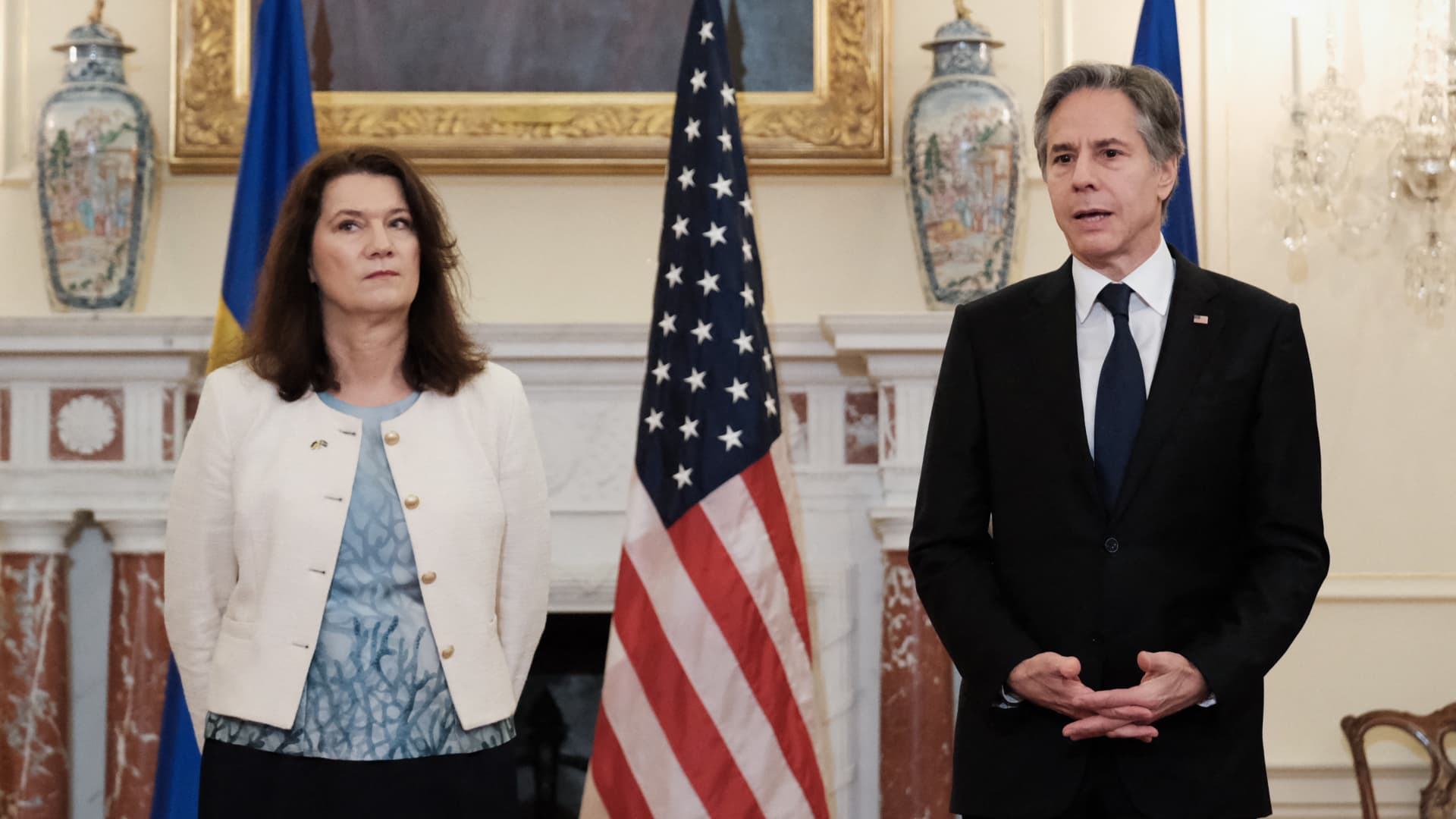
Sweden's foreign minister says the United States is willing to provide "security assurances" during the application period if Sweden and neighboring Finland seek membership in NATO.
Ann Linde spoke to Swedish public broadcaster SVT from Washington after meetings with U.S. Secretary of State Antony Blinken and members of the Senate Committee on Foreign Relations.
Linde said there is great interest from the U.S. in Sweden and Finland joining NATO.
Jolted by Russia's invasion of Ukraine, Sweden and Finland appear ready to revoke their long-standing policy of military non-alignment and apply for NATO membership.
Russia has warned of unspecified consequences if that happens and both countries have been looking for some form of NATO protection from the moment they apply to when they become members, a process that can take months.
— Associated Press
Russian forces largely stalled in eastern and southern Ukraine, Pentagon says
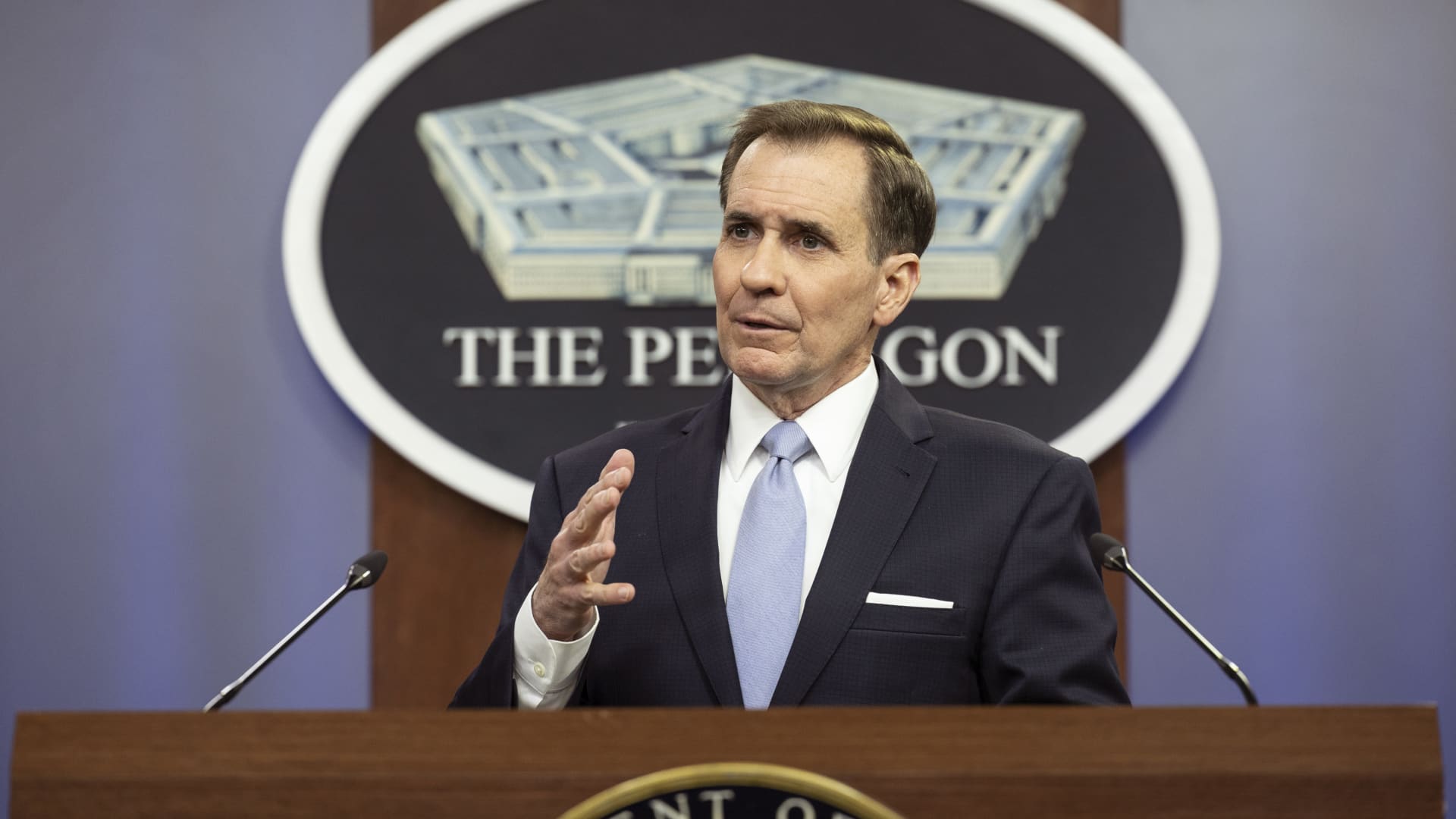
Pentagon spokesman John Kirby said the Russians have made uneven progress in the Donbas region of Ukraine, following weeks of resupply and reposition efforts.
"Russians have not made the kind of progress in the Donbas and in the south that we believe they wanted to make," Kirby said during a daily Pentagon press briefing. "We do believe they're behind schedule. We do believe it has been slow at every turn and they have met a stiff Ukrainian resistance," he added.
Kirby's comments come as the U.S. and its allies rush to send additional security assistance ahead of what was believed to be an intensifed Russia surge in eastern and southern Ukraine. On Tuesday, President Joe Biden called on Congress to quickly pass $33 billion in additional U.S. security assistance to Ukraine.
Biden's latest military aid package of $800 million announced on April 21, the eighth such installment of security assistance, brings U.S. commitment to $3.4 billion since Russia's late February invasion.
— Amanda Macias
Russian Orthodox Church scolds Pope Francis after 'Putin's altar boy' remark
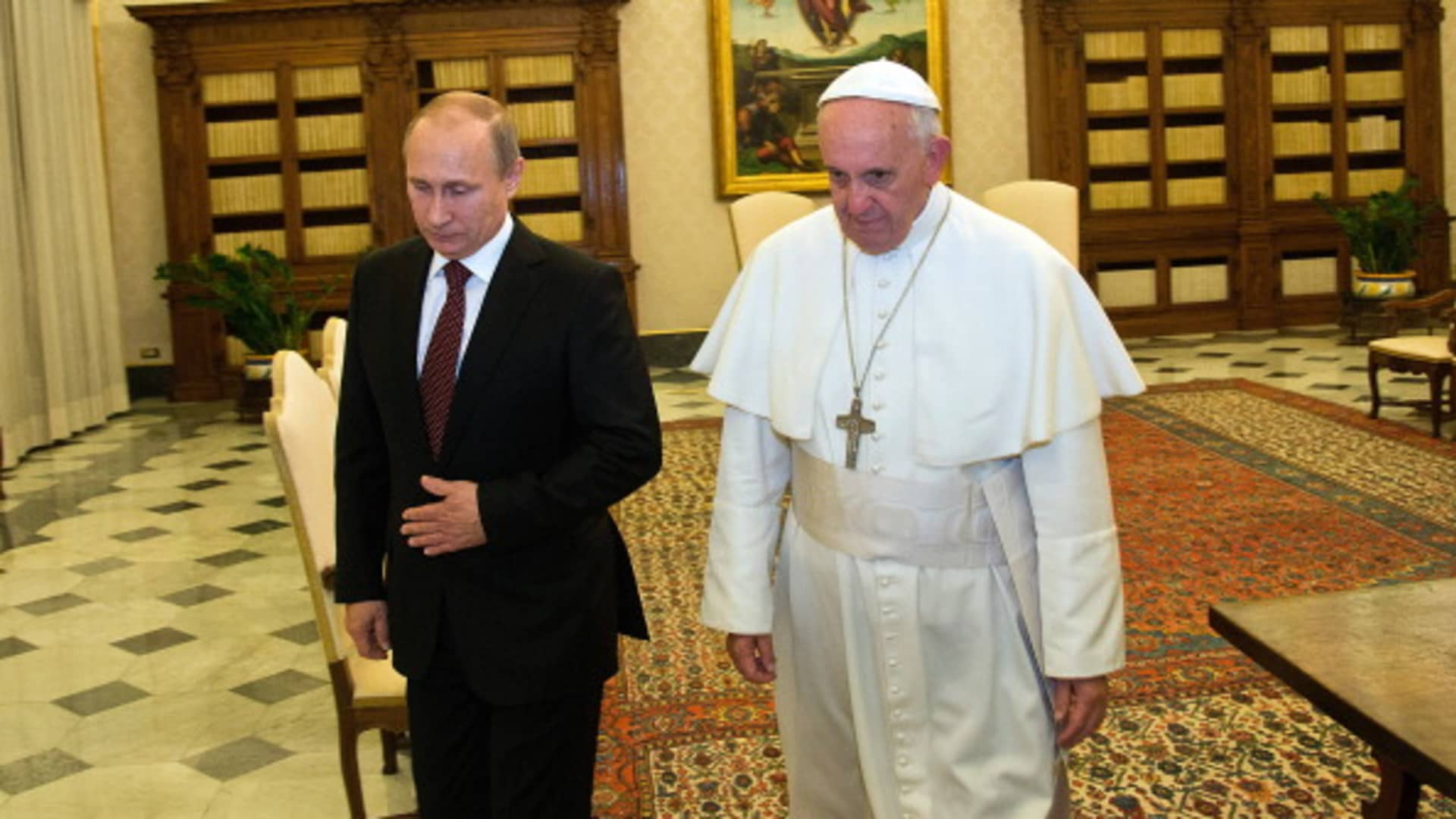
The Russian Orthodox Church scolded Pope Francis for using the wrong tone after he urged Patriarch Kirill not to become the Kremlin's "altar boy," cautioning the Vatican that such remarks would hurt dialogue between the churches.
Francis told Italy's Corriere Della Sera newspaper that Kirill, who has given the Ukraine war his backing, "cannot become [President Vladimir] Putin's altar boy." The Russian Orthodox Church said it was regrettable that a month and a half after Francis and Kirill, the patriarch of Moscow and All Russia, had spoken directly, the pope had adopted such a tone.
"Pope Francis chose an incorrect tone to convey the content of this conversation," the Moscow Patriarchy said, though it did not explicitly mention the "altar boy" comment. "Such statements are unlikely to contribute to the establishment of a constructive dialogue between the Roman Catholic and Russian Orthodox Churches, which is especially necessary at the present time."
Kirill, 75, a close ally of Putin, sees the war as a bulwark against a West he considers decadent, particularly over the acceptance of homosexuality.
— Reuters
Federal Reserve says Ukraine invasion, Chinese Covid lockdowns likely to aggravate inflation
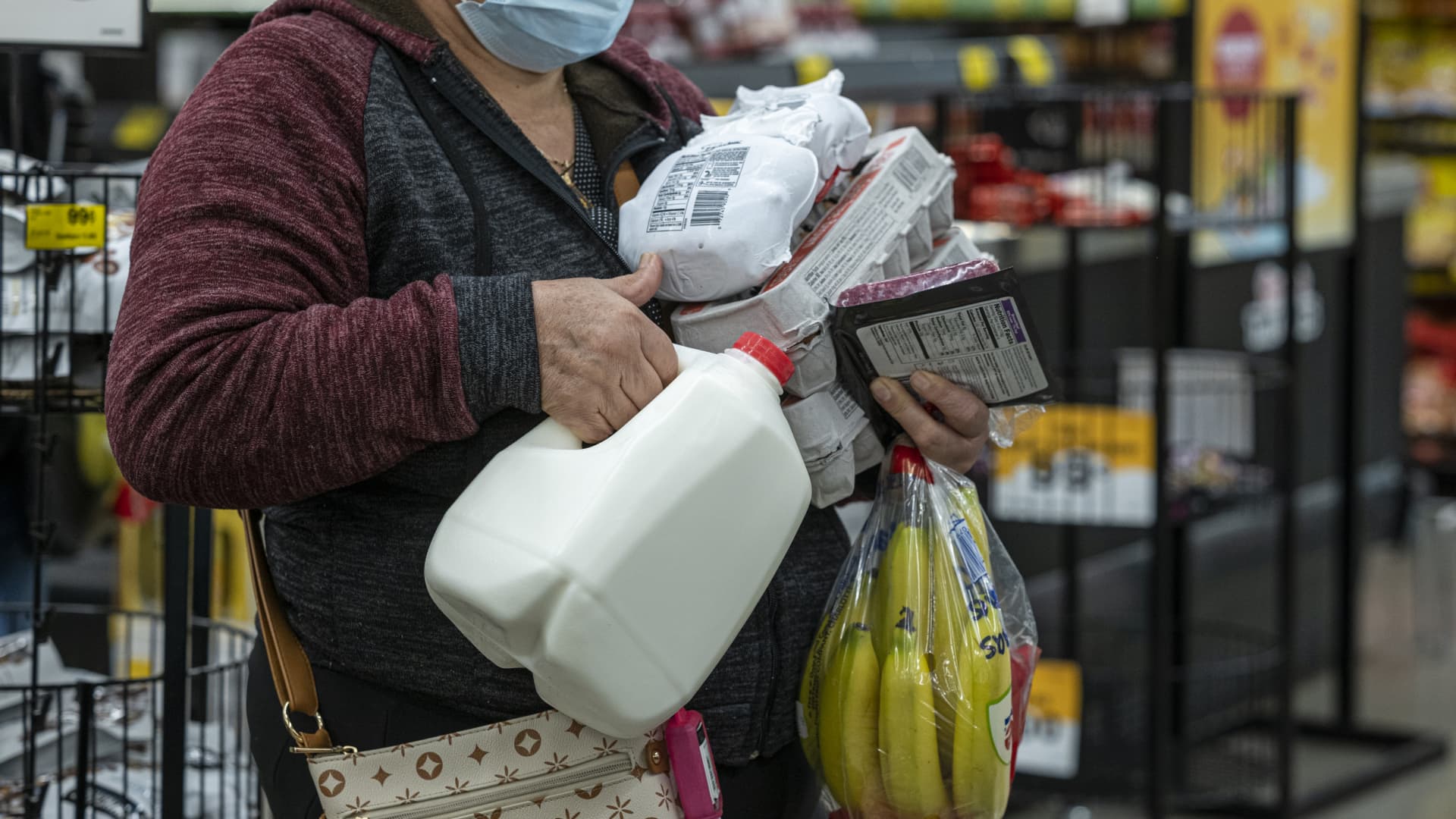
The Federal Reserve, the U.S. central bank, said that Russia's invasion of Ukraine and China's Covid-related lockdowns are both expected to fuel rising prices.
The Fed said in a statement that war in Ukraine is "creating additional upward pressure on inflation" and will likely "weigh on economic activity." It also suspects Beijing's latest pandemic restrictions will continue to disrupt key global supply chains.
The central bank is tasked by U.S. lawmakers to keep inflation tame and maximize employment through adjustments to interest rates. It opted to raise the overnight lending rate by half a percentage point at its May meeting to cool inflation, in the largest such increase since 2000.
— Thomas Franck
Germany's Scholz says sanctions could set Russia's economy back by decades
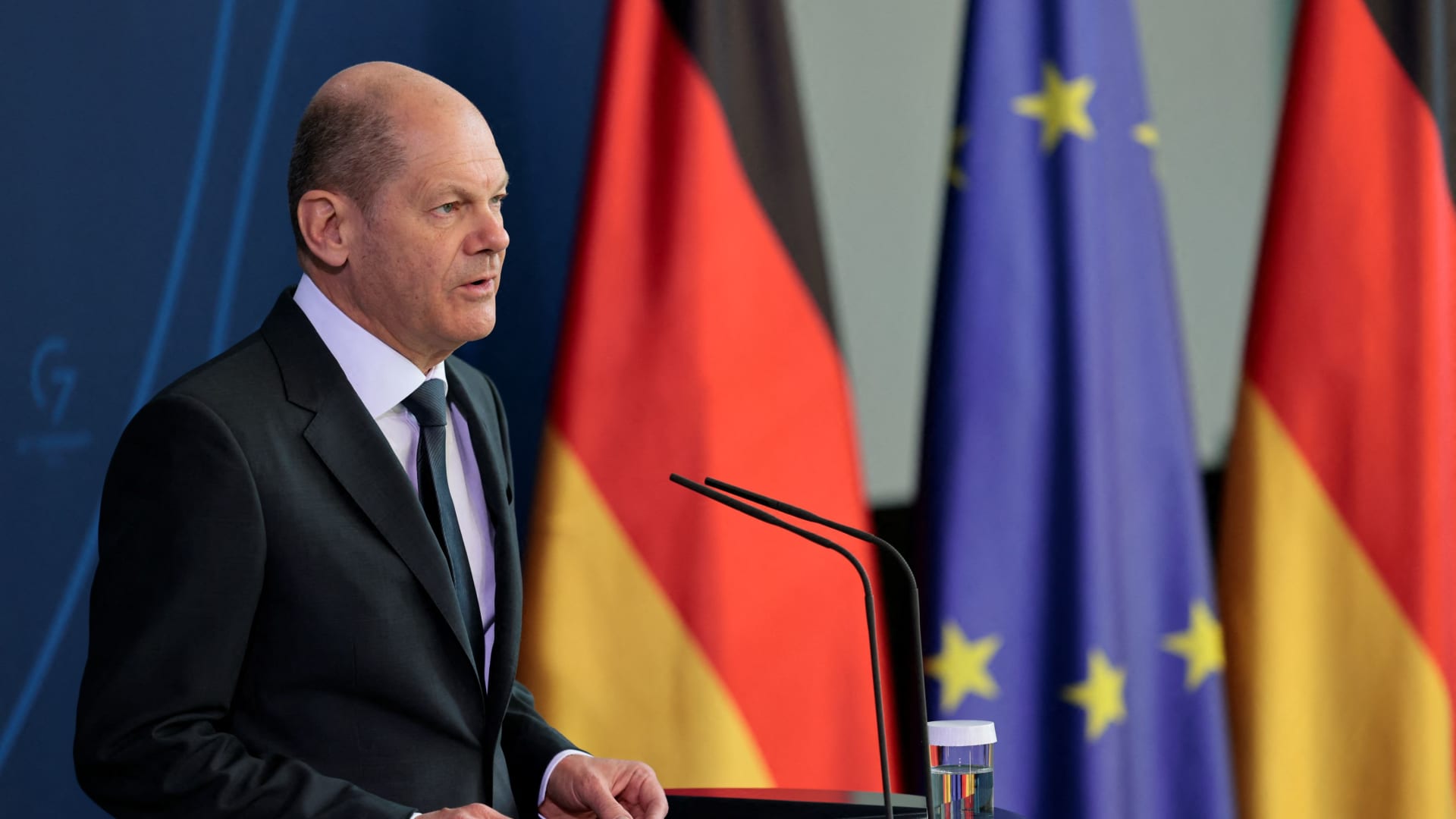
German Chancellor Olaf Scholz says the sanctions imposed by his country and others against Moscow over its war in Ukraine will set back Russia's economic development by decades if they remain in place.
Scholz told reporters in Berlin that Russia cannot hope to win a peace with Ukraine unless Kyiv supports it.
"A peace by diktat will not work," he said.
— Associated Press
Russian strikes targeting critical infrastructure in Mariupol and Donbas region, U.S. Defense official says
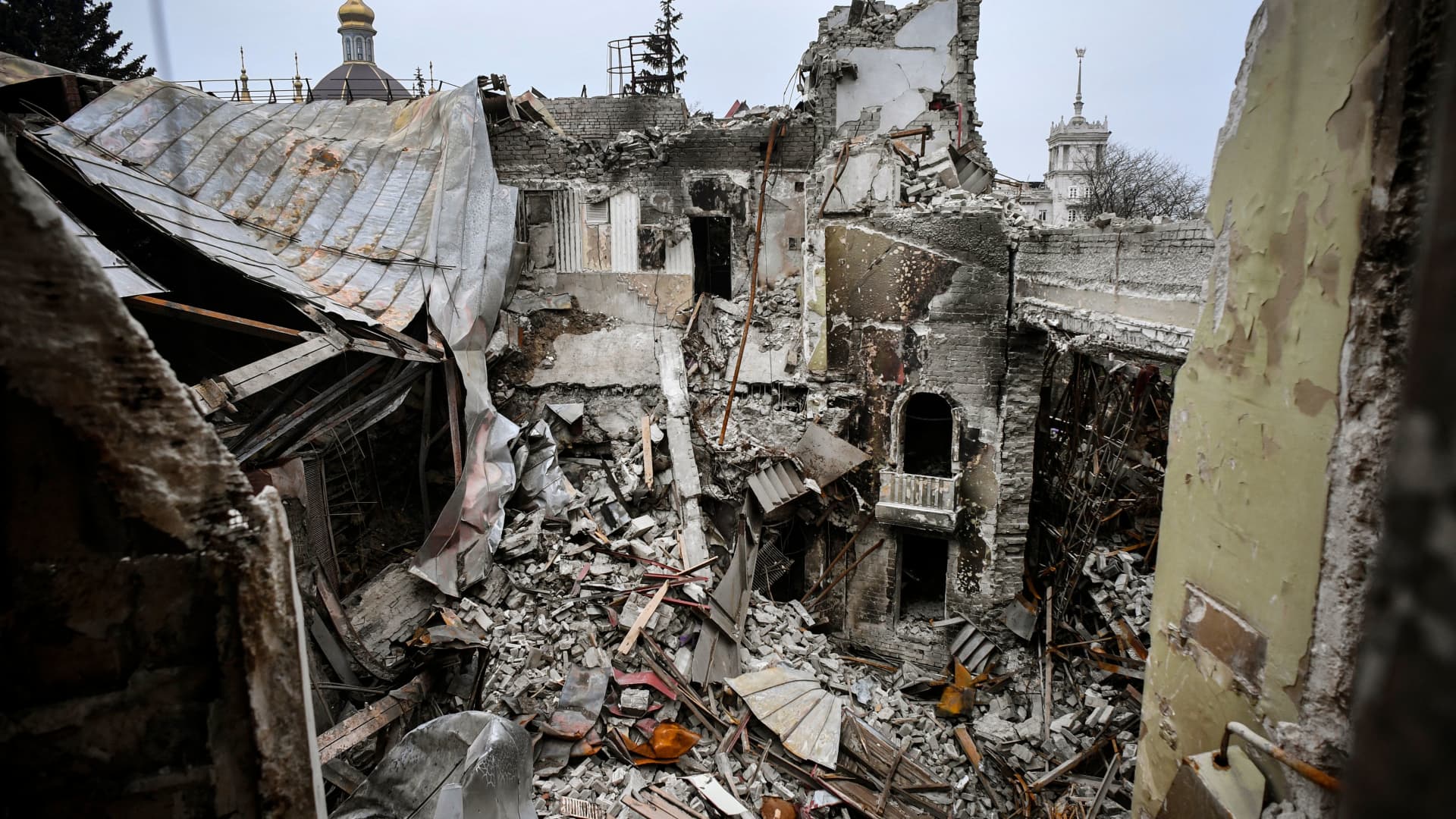
Russian forces are carrying out about 40 to 50 missile strikes a day against Ukraine, with a high focus on the Donbas region and north of Mariupol, a senior U.S. Defense official said.
The U.S. has observed Russian aircraft fly nearly 250 sorties over Ukraine, said the official, who spoke on the condition of anonymity in order to share updates on the ongoing war in Ukraine.
"They are still hitting Mariupol and they are still wary of flying in Ukrainian airspace so they're largely launching these things from outside Ukrainian airspace to the degree that they can," the official said.
The airstrikes are largely targeting Ukrainian critical infrastructure, including electricity and railroads, according to evolving U.S. military intelligence. The official said that so far the strikes have not had an appreciable impact on Ukraine's ability to continue the fight.
— Amanda Macias
Photos show mass destruction in Chernihiv as Russia pulls out
Russia's withdrawal from Chernihiv after a month-long assault left behind a devastated city that Ukraine will need massive foreign aid, and many years of work, to restore.
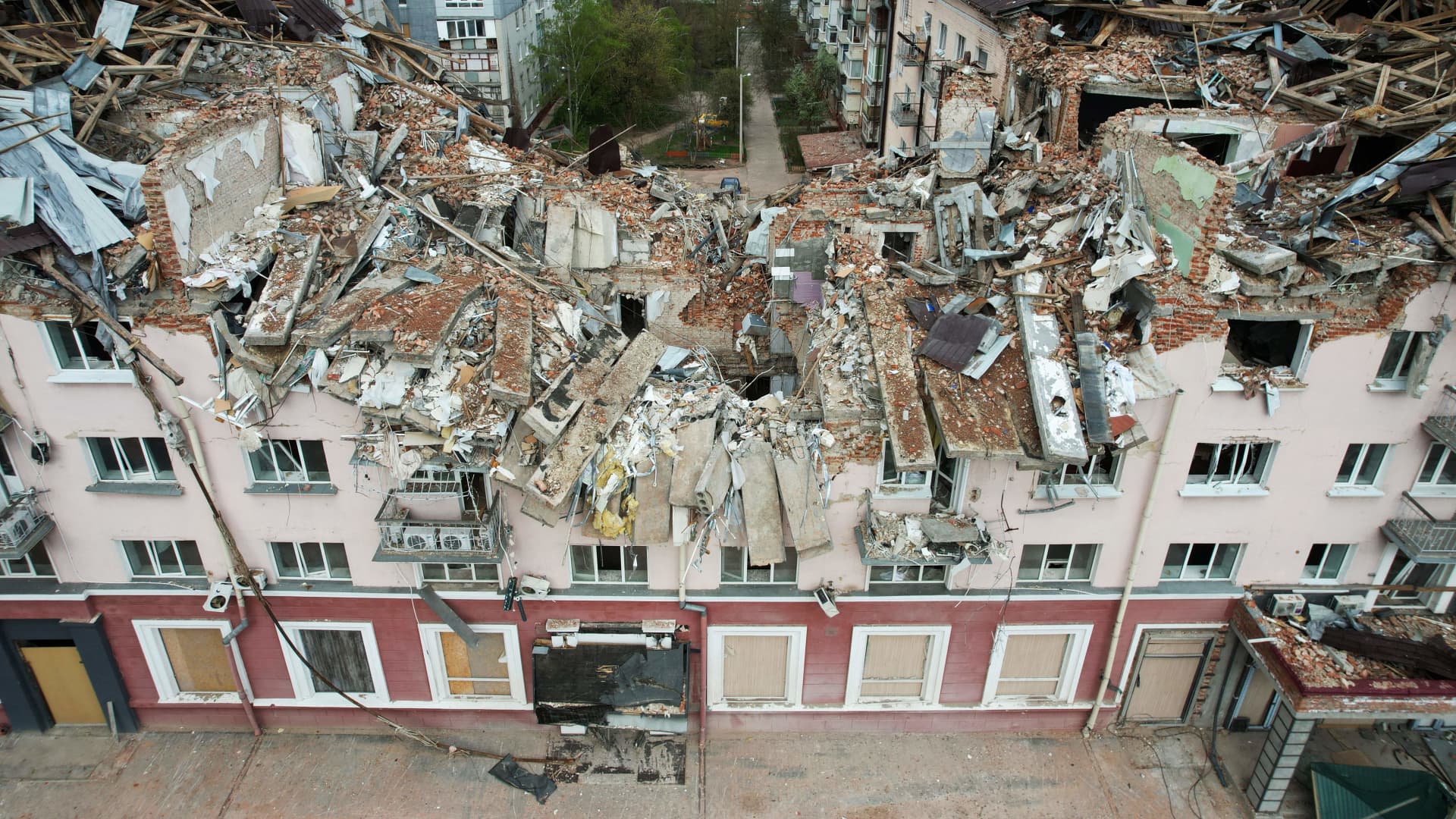
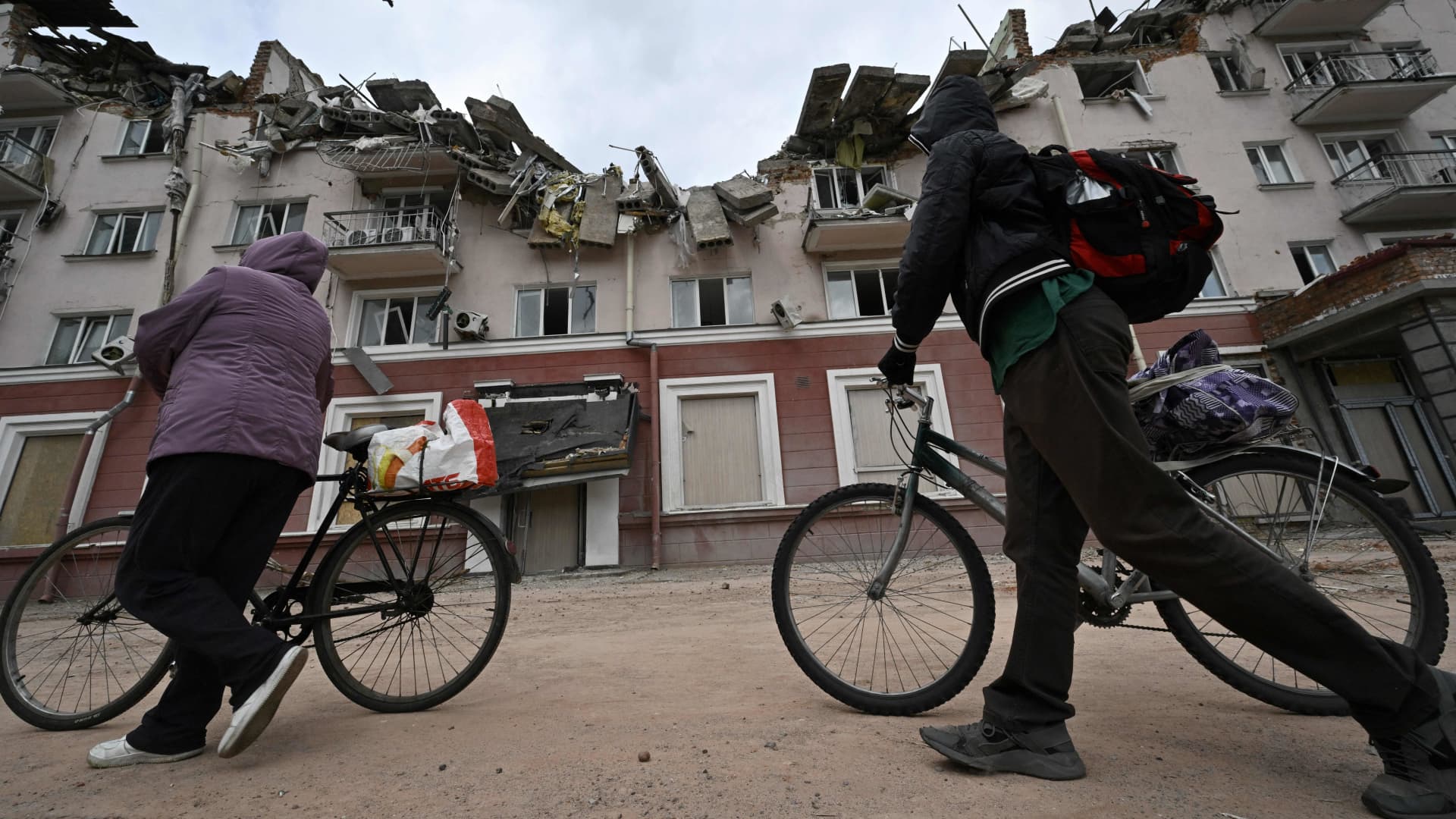
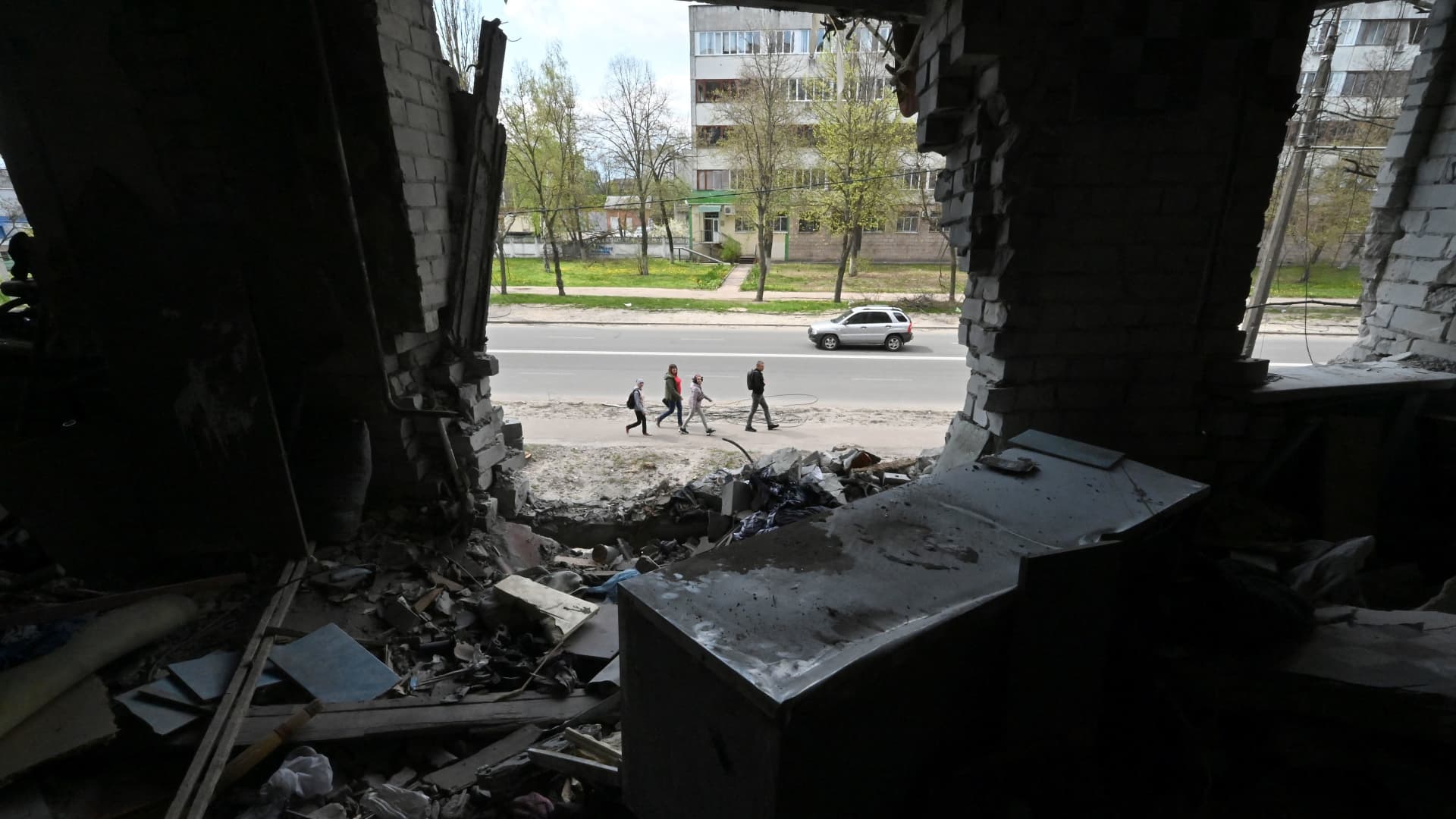
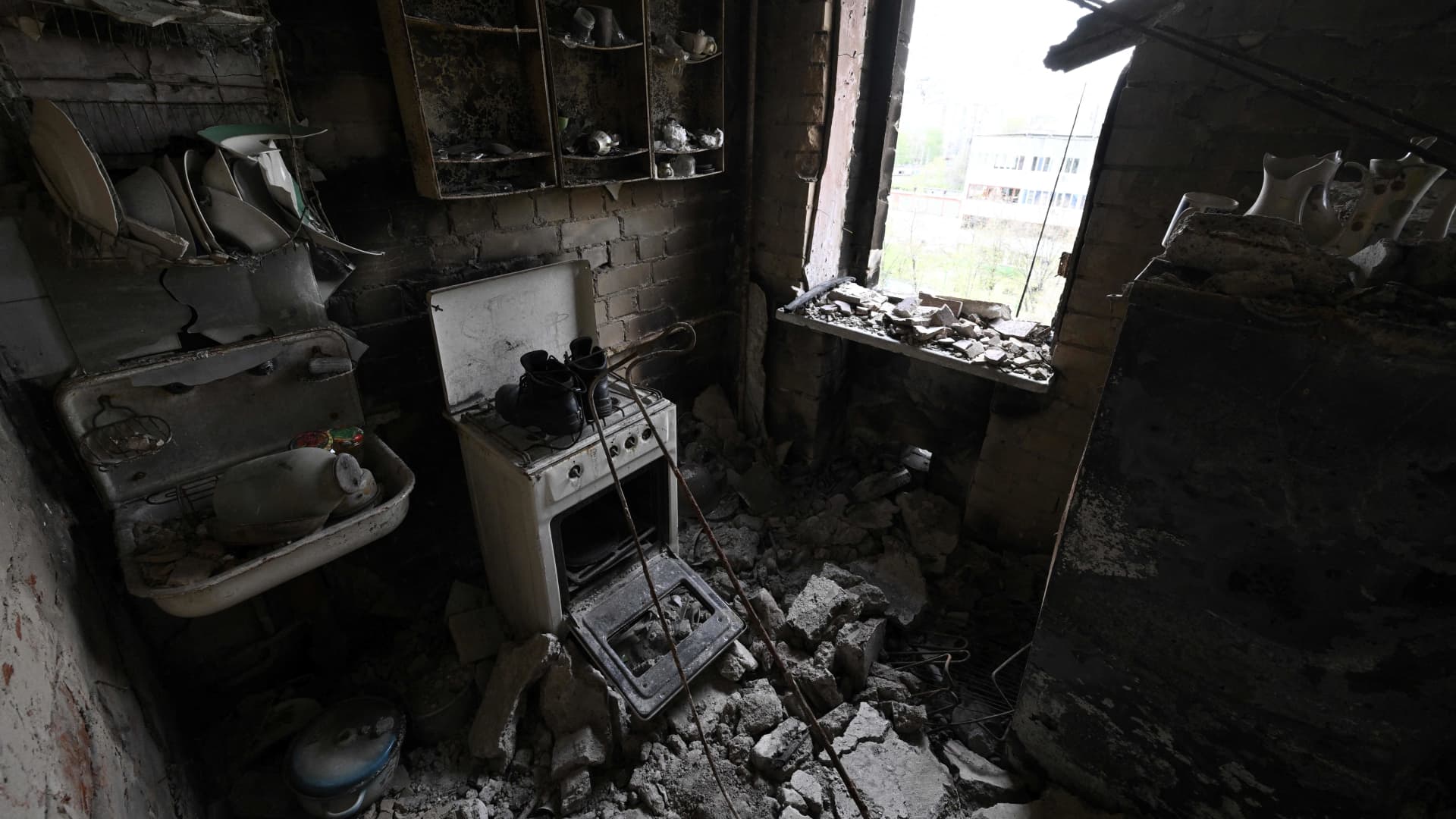
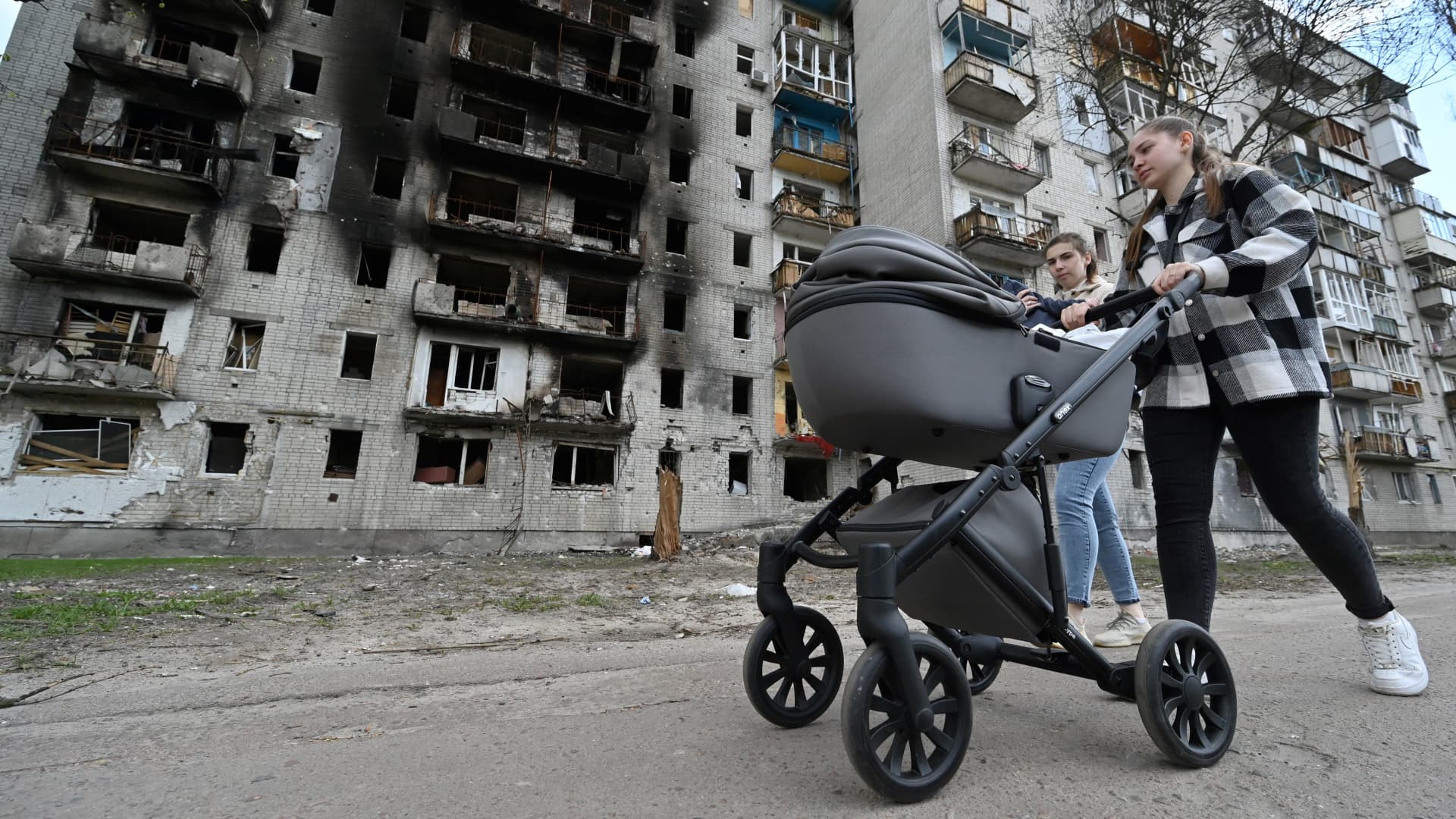
— Getty Images
Nearly all U.S. howitzers have arrived for the fight in Ukraine, U.S. Defense official says
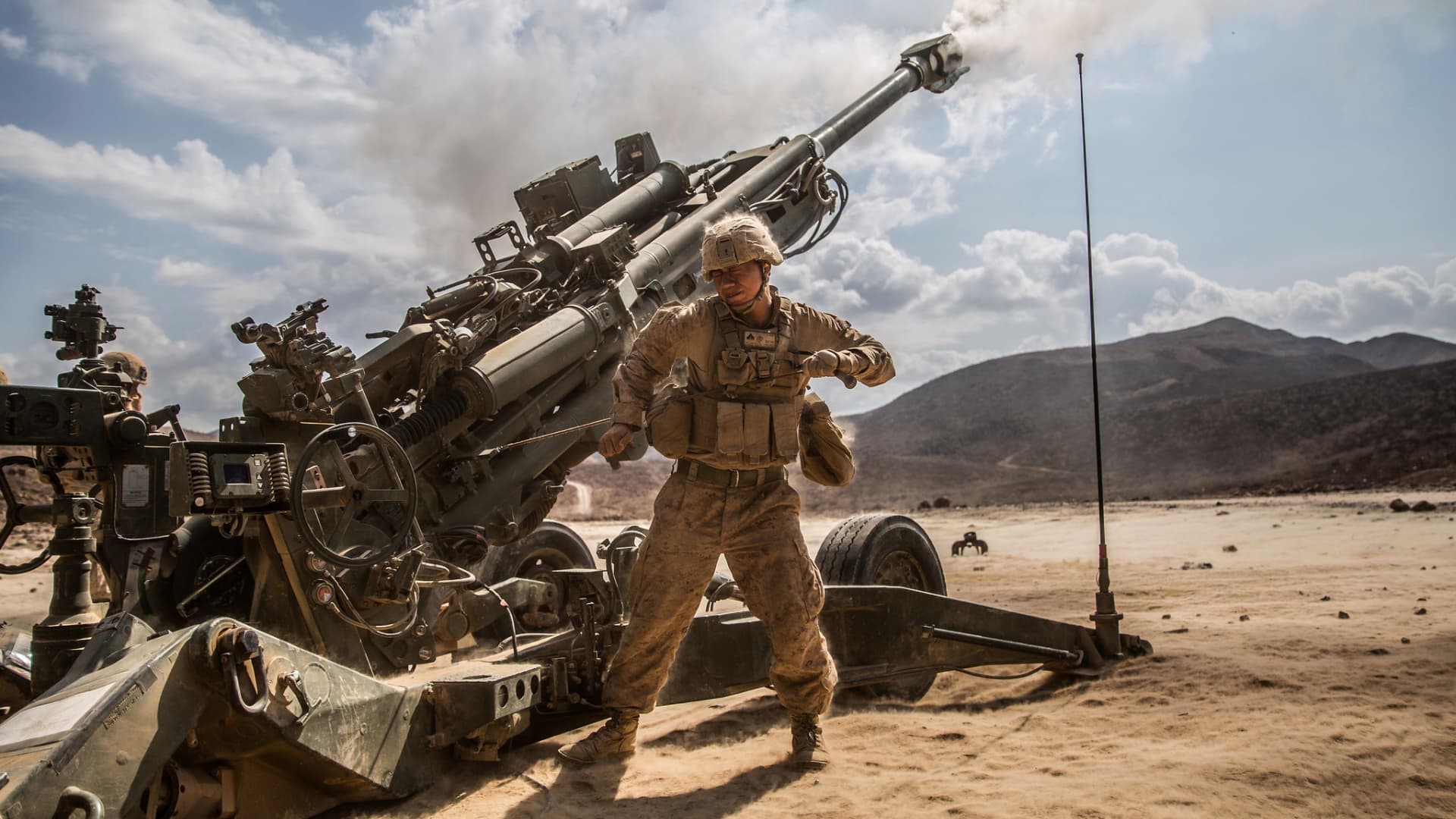
About 90% of the howitzers pledged in the last two U.S. security assistance packages have arrived for the fight in Ukraine, a senior Defense official confirmed.
The official, who spoke on the condition of anonymity in order to share updates on the ongoing war in Ukraine, declined to say where and how many howitzers have been used in battle.
"We're not consistently trying to draw out every detail of every munition that goes in and where it is and how they're using it. Our focus is on getting it to them, their focus is on getting it into the fight and using it and that's happening," the official said.
The last two U.S. weapons packages for Ukraine have included a total of 90 howitzer artillery systems. These are the first-known heavy artillery platforms to be transferred from U.S. Army and U.S. Marine Corps stockpiles to Ukrainian forces. The Pentagon has previously confirmed that Ukrainian forces will train alongside U.S. troops before operating the howitzers.
Along with the howitzers, the U.S. has sent approximately 184,000 artillery rounds. Here's a look at the other weapons the U.S. has committed to the fight.
— Amanda Macias
Biden to speak to G-7 leaders about potential sanctions on Russia
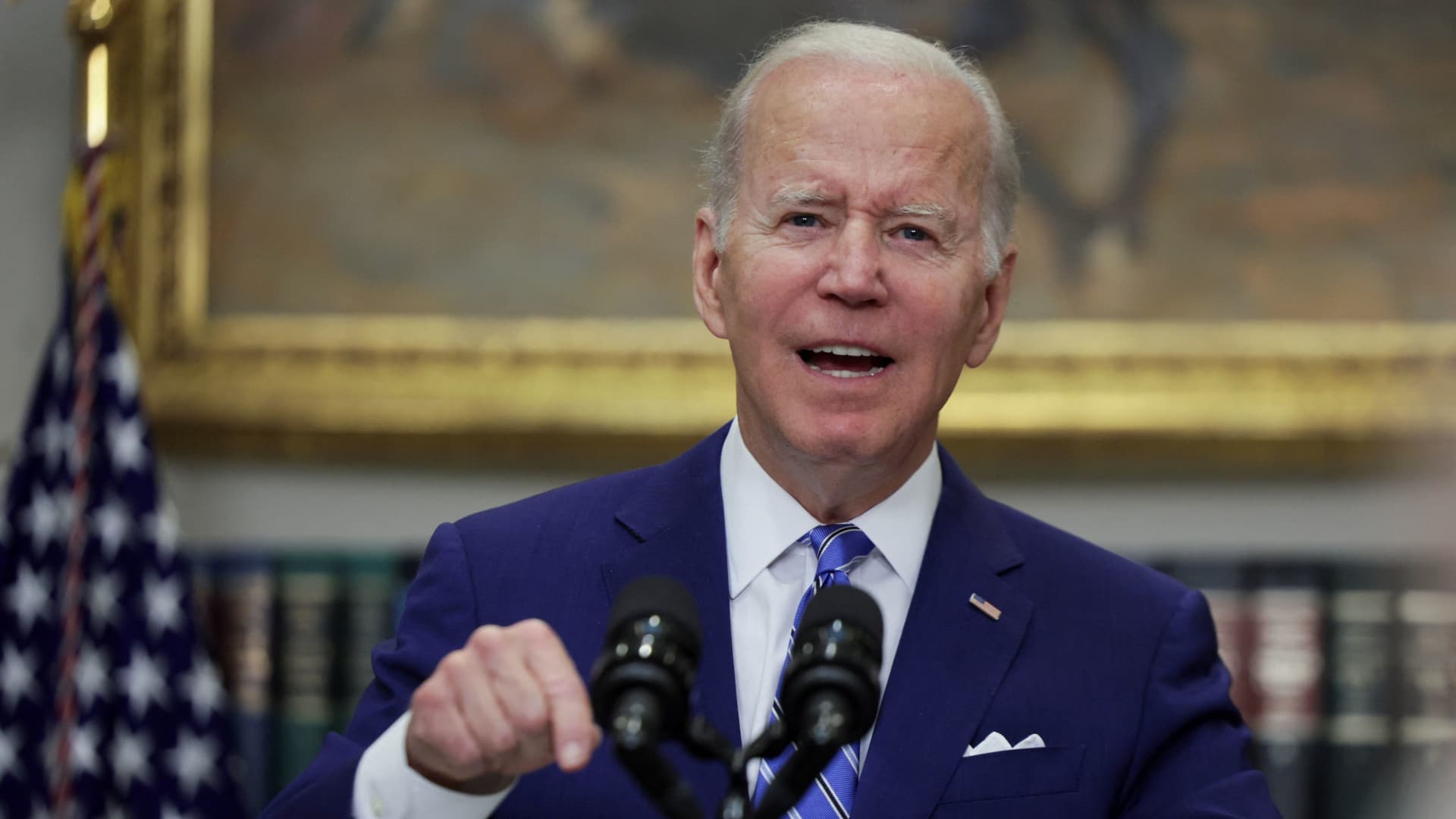
U.S. President Joe Biden said he would speak with other leaders from the Group of Seven advanced economies this week about potential additional sanctions against Russia over its war in Ukraine.
— Reuters
UNICEF says dozens of schools in Ukraine have been destroyed
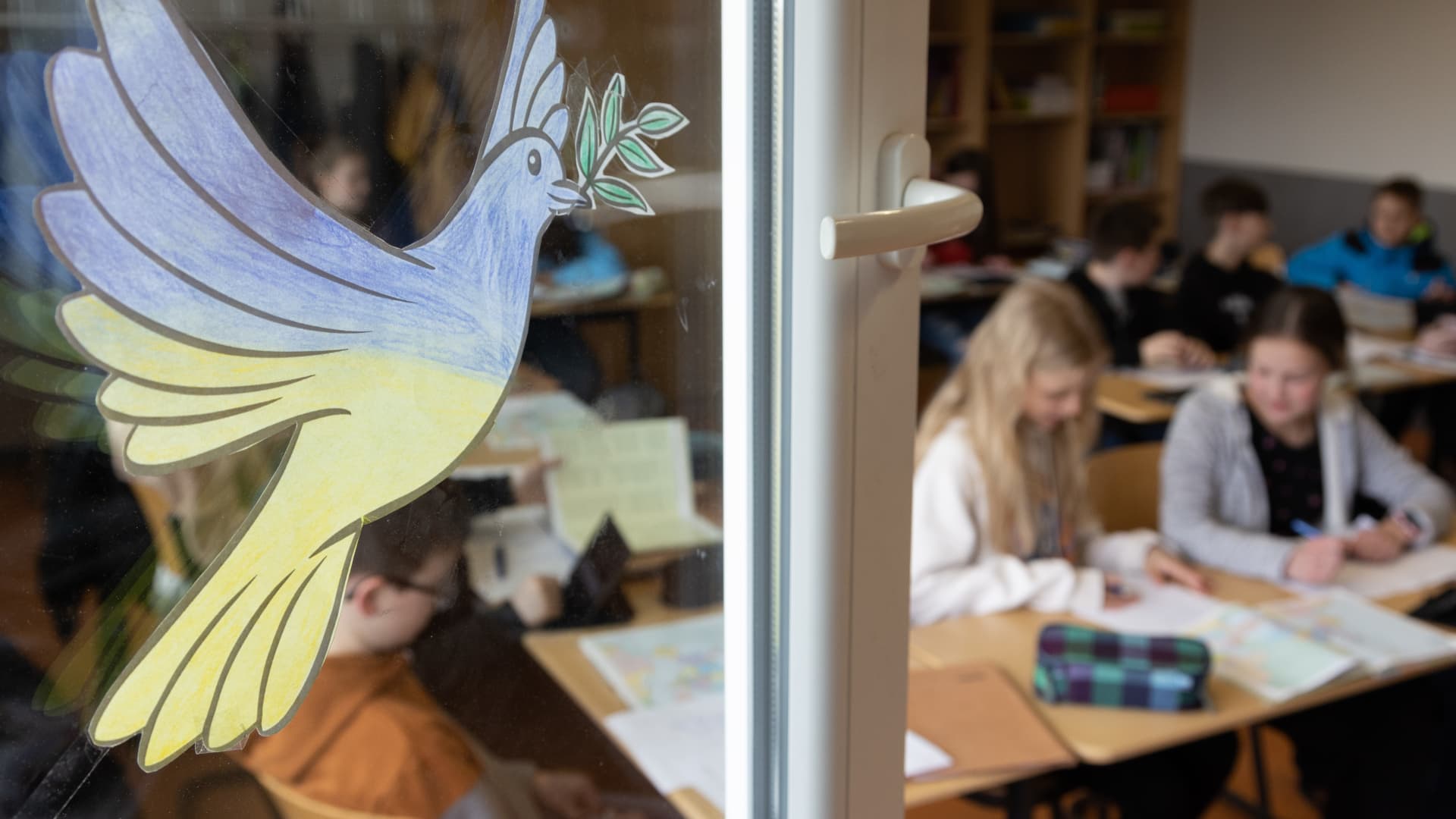
The United Nations Children's Fund, or UNICEF, said dozens of schools and other educational facilities have been destroyed in Ukraine, as it called for the protection of schools and children under humanitarian law.
The humanitarian organization said that at least one in six UNICEF-supported schools in eastern Ukraine have been damaged or destroyed since the start of the Kremlin's war in Ukraine.
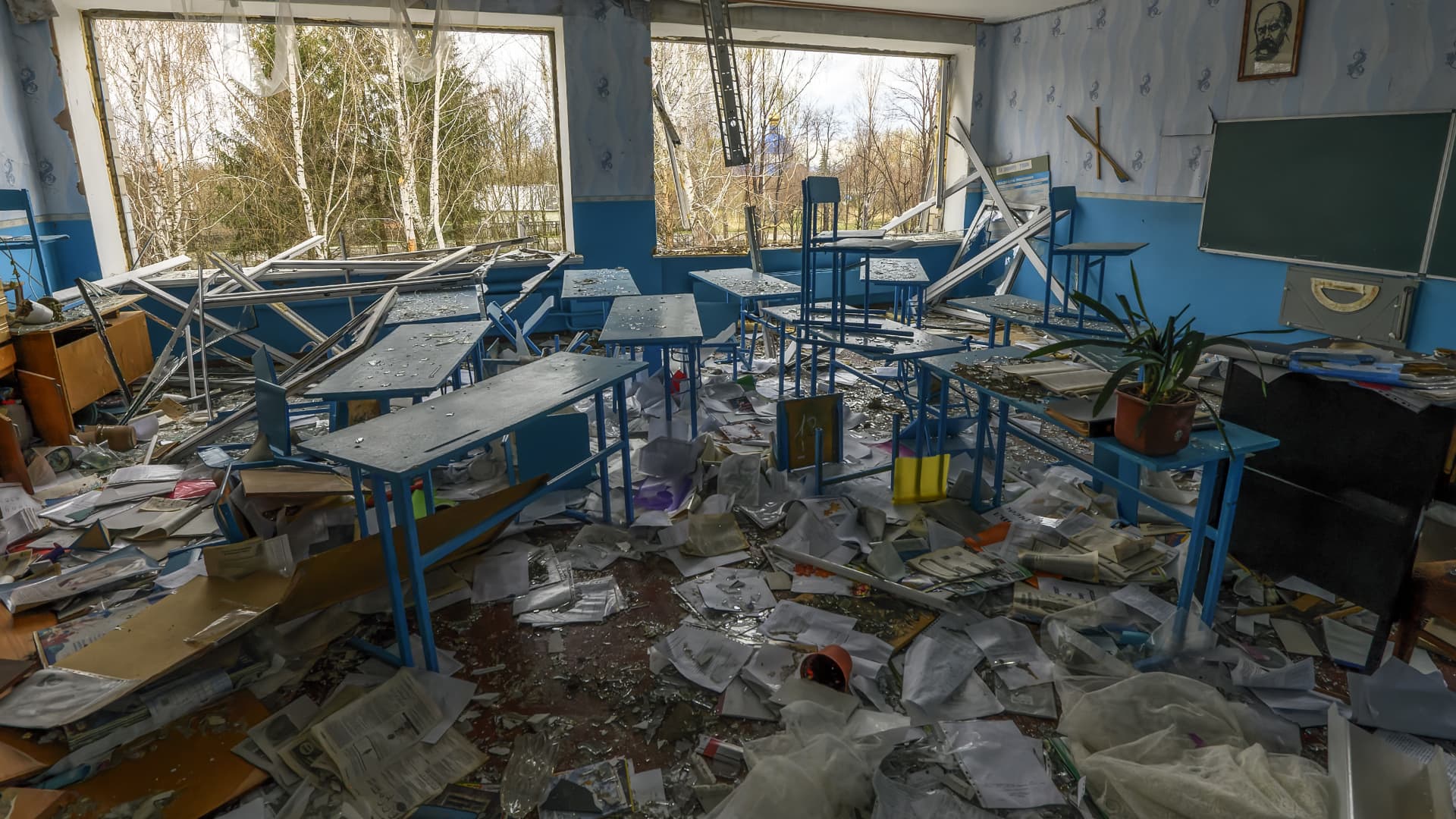
"The start of the academic year in Ukraine was one of hope and promise for children following COVID-19 disruptions," said Murat Sahin, UNICEF Representative to Ukraine, in a statement. "Instead, hundreds of children have been killed, and the school year ends amid the closure of classrooms due to war and the decimation of educational facilities.
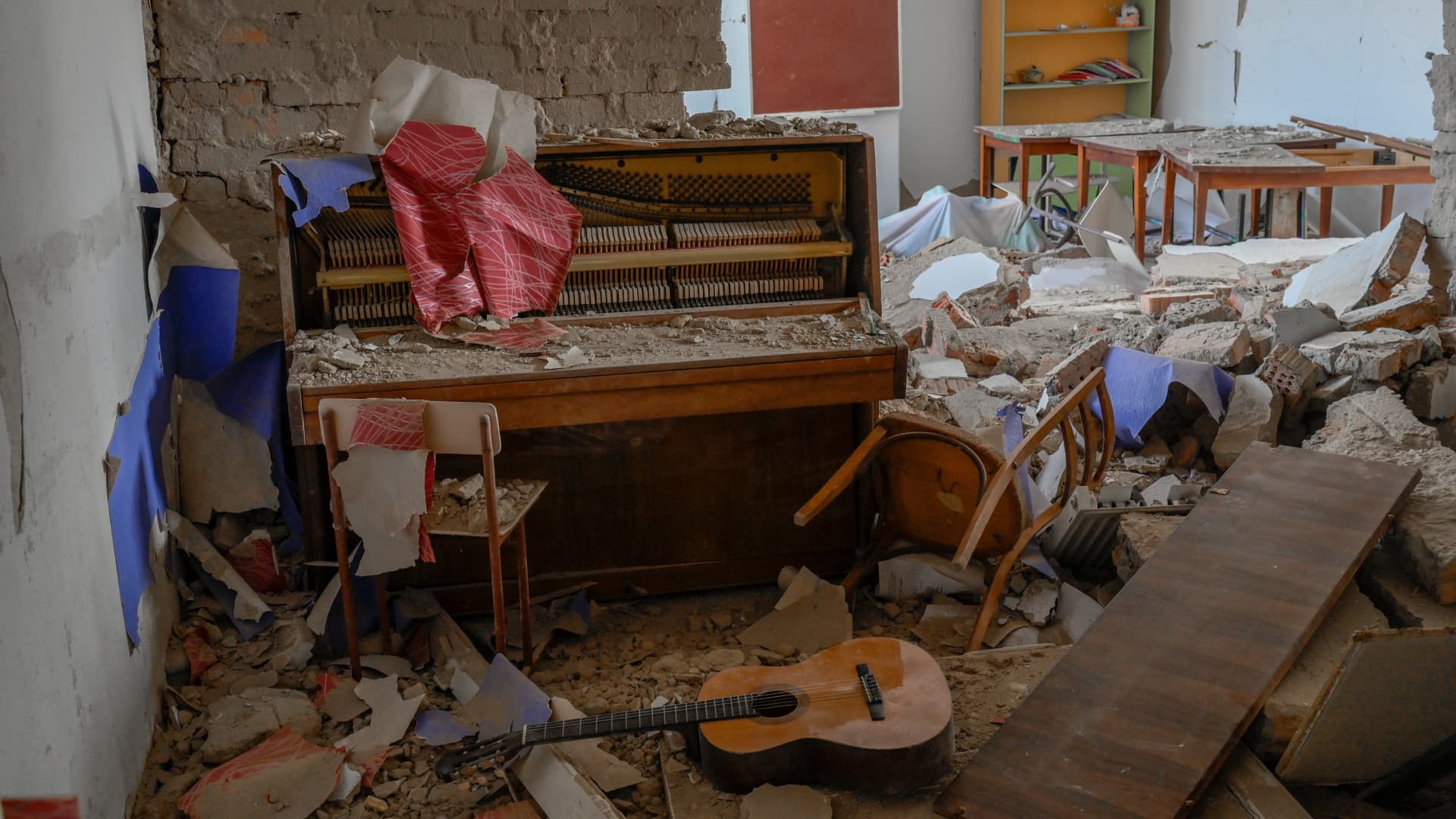
"Ensuring access to education can be the difference between a sense of hope or despair for millions of children," Sahin said, adding that two schools in Ukraine were destroyed in the past week. "This is crucial for their future and that of all Ukraine."
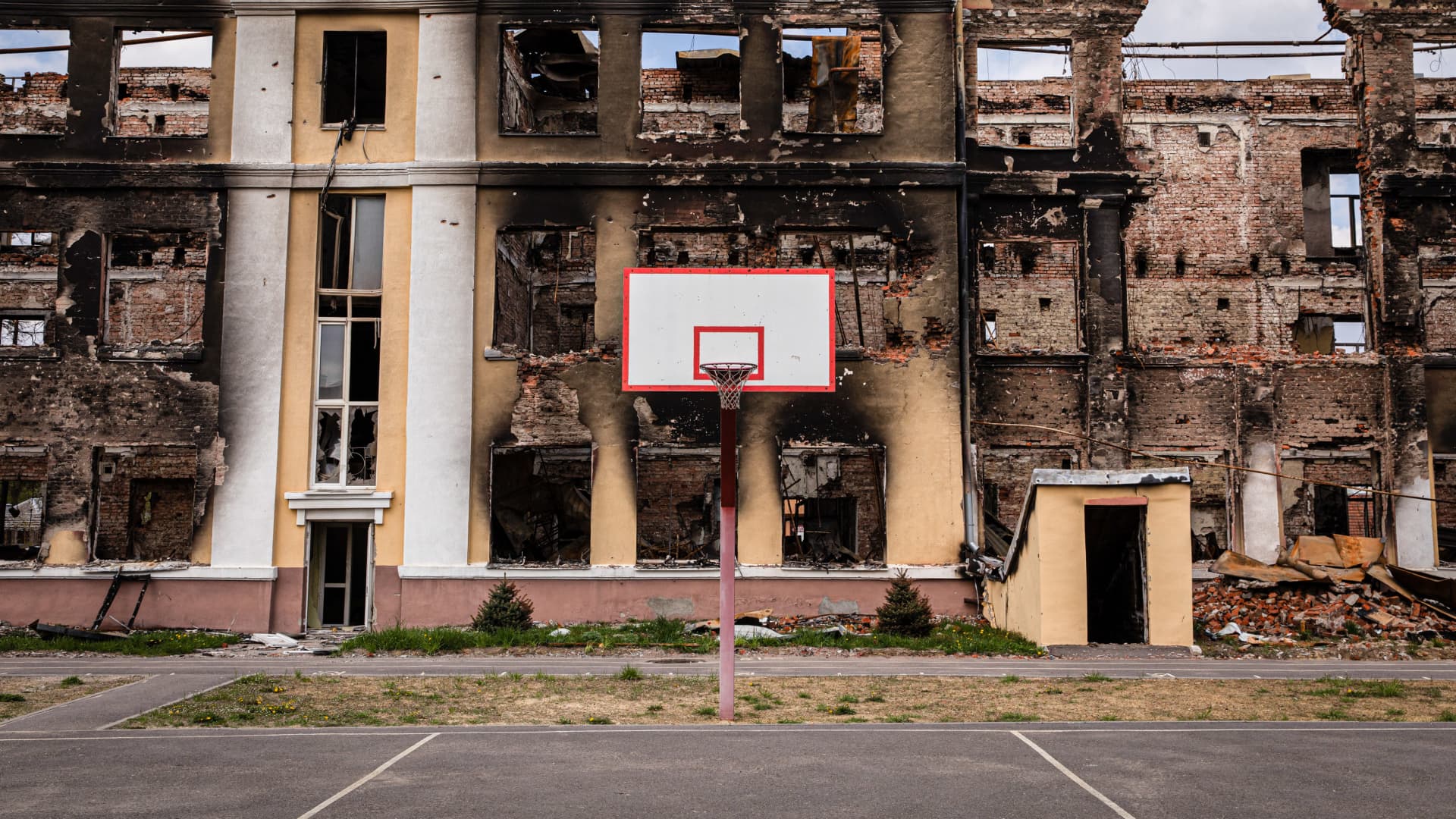
The humanitarian organization wrote that it has set up makeshift schools in dozens of metro stations, where children and their families have been forced to shelter for safety.
— Amanda Macias
People from Mariupol evacuate to Zaporizhzhia
A U.N. convoy carrying people from Mariupol arrives in Kamianske, Zaporizhzhia, Ukraine as Russian attacks continue.
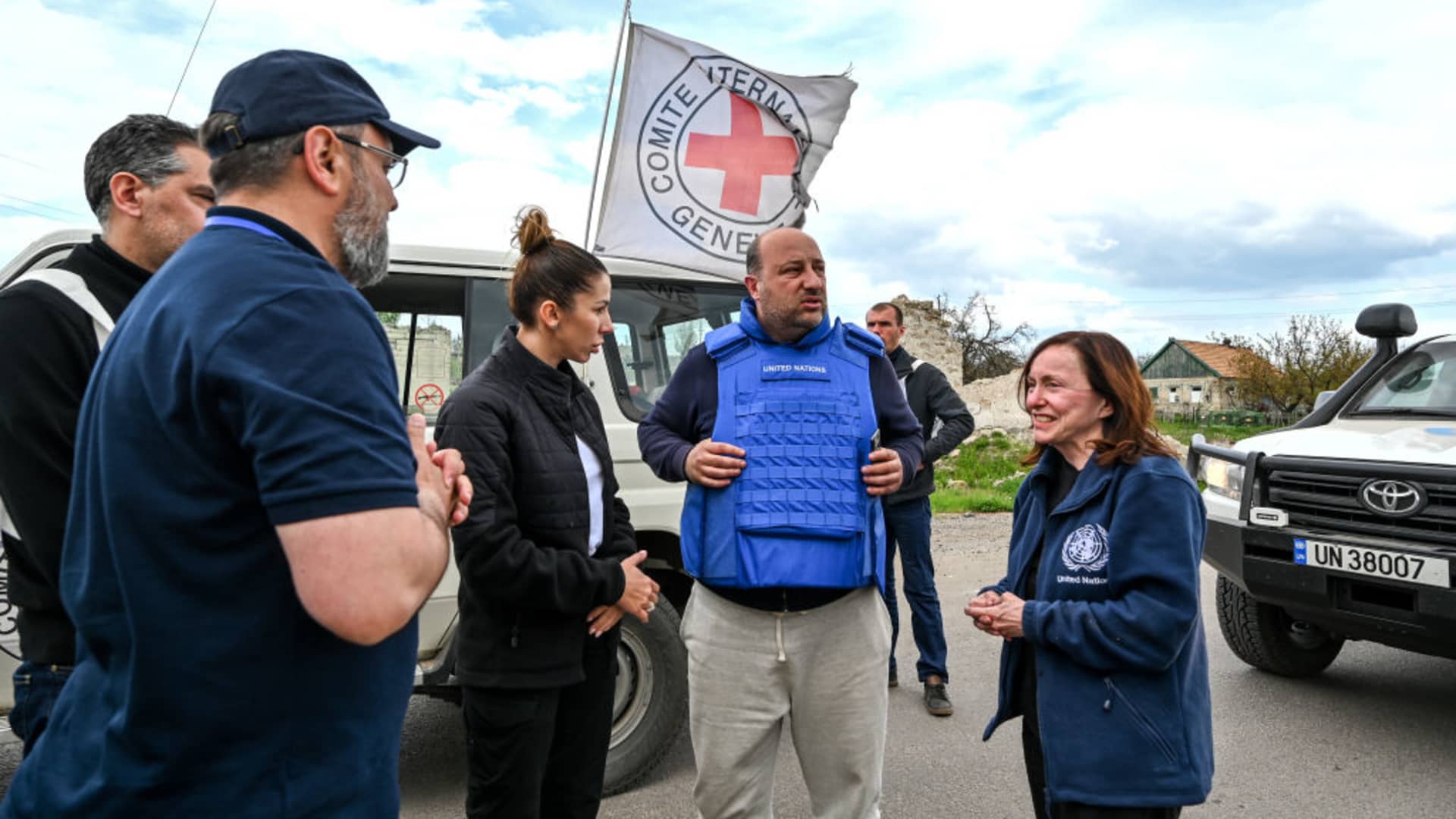
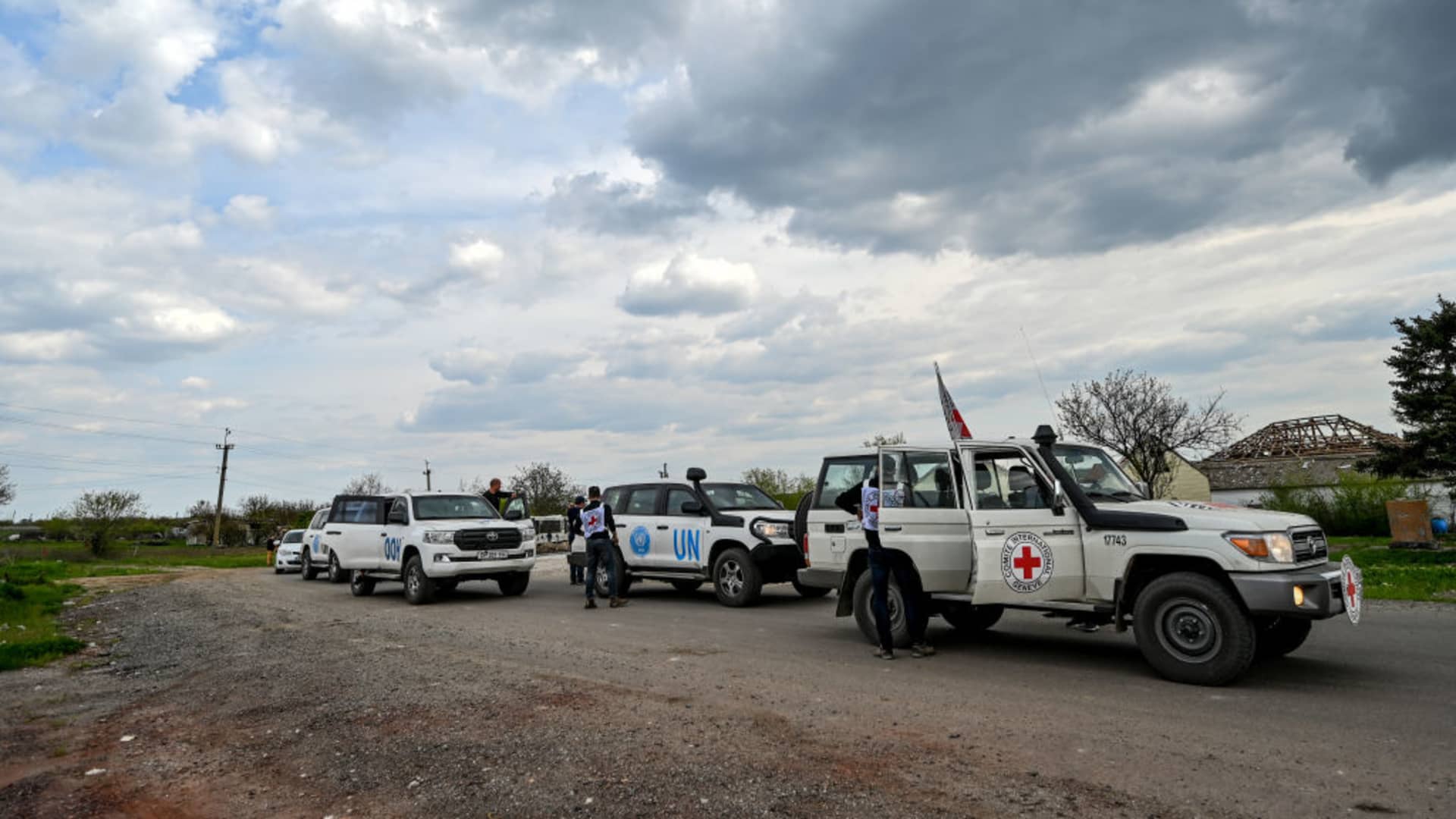
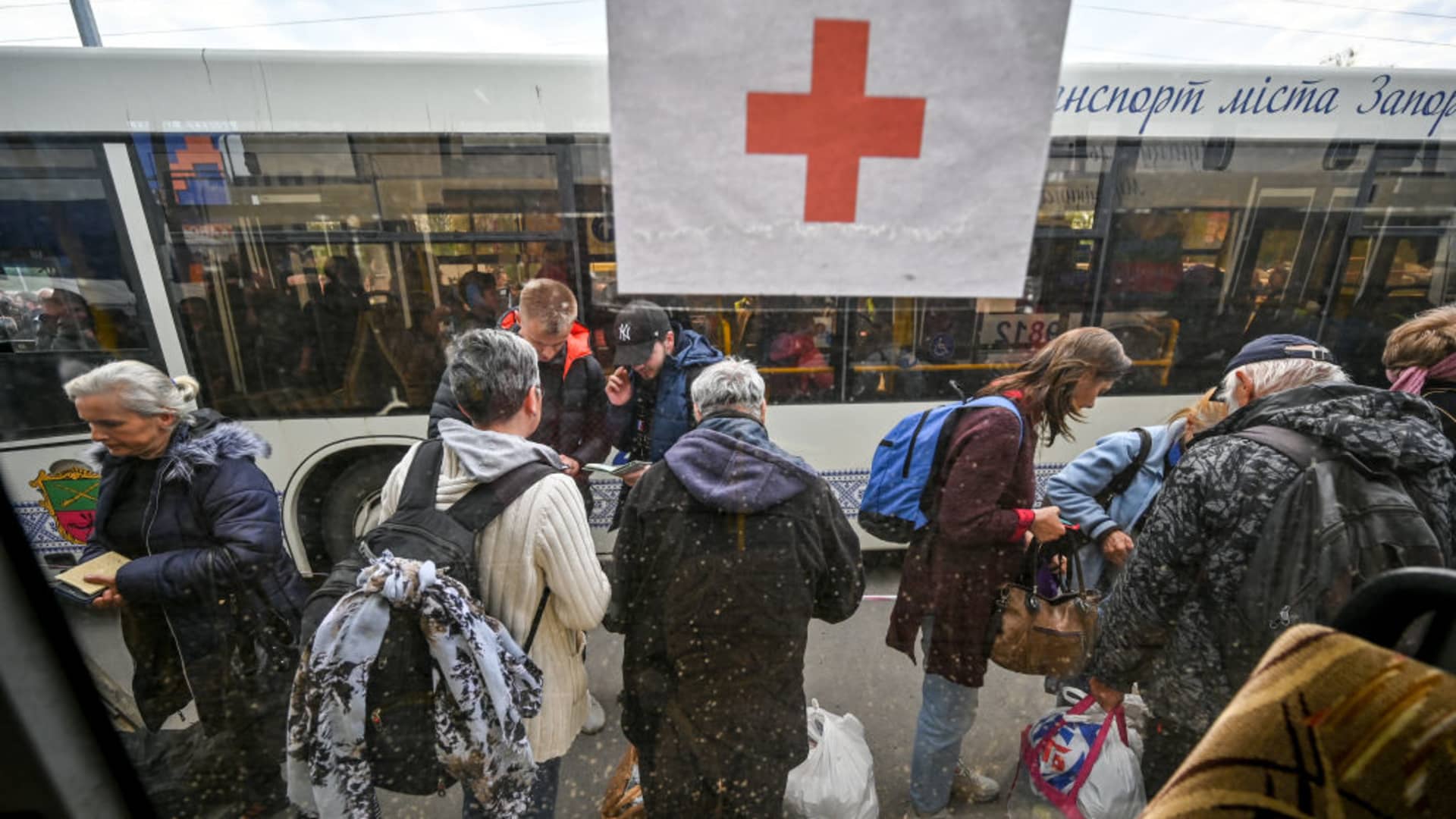
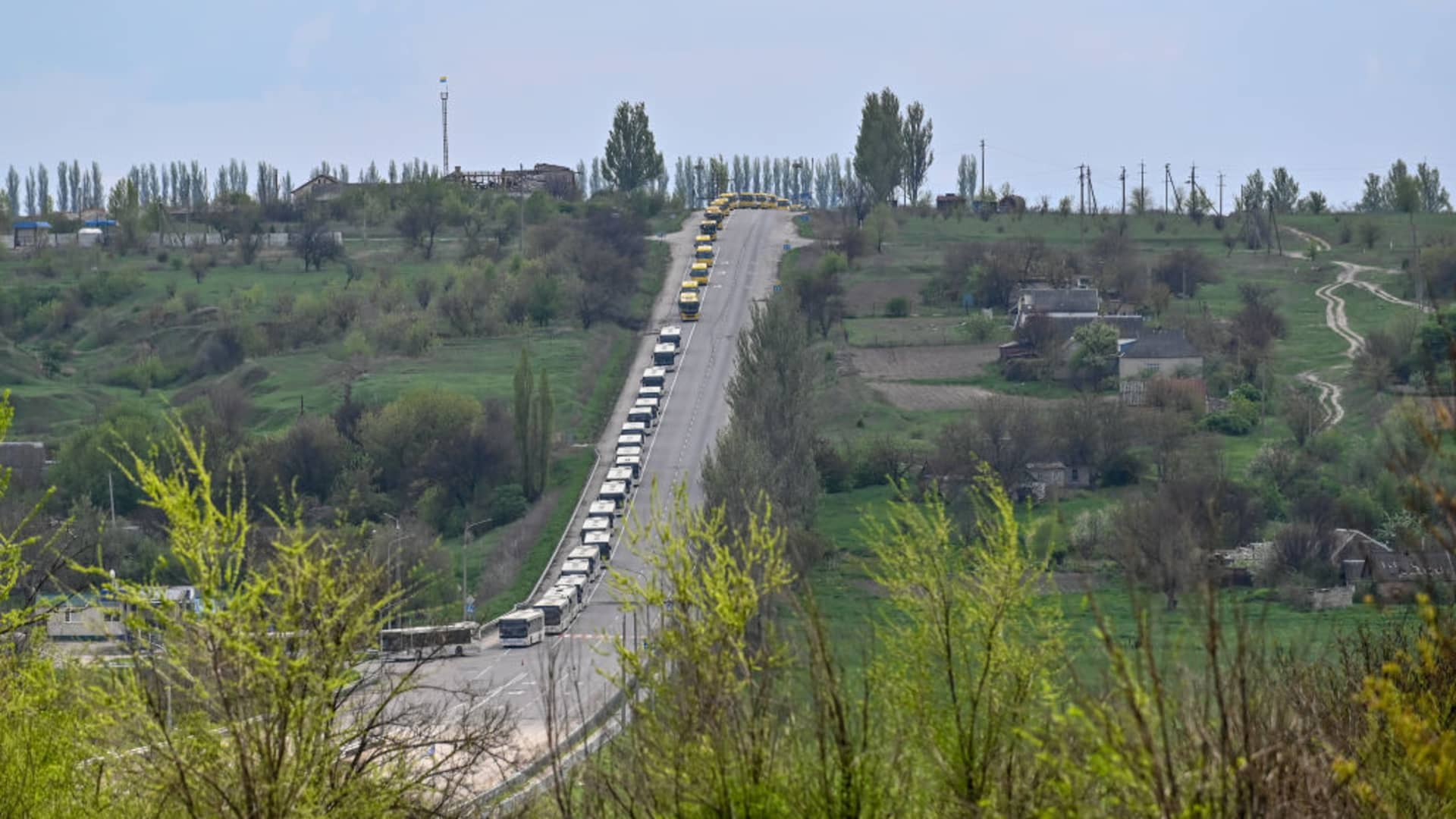

— Getty Images
EU considers providing additional support to Moldova
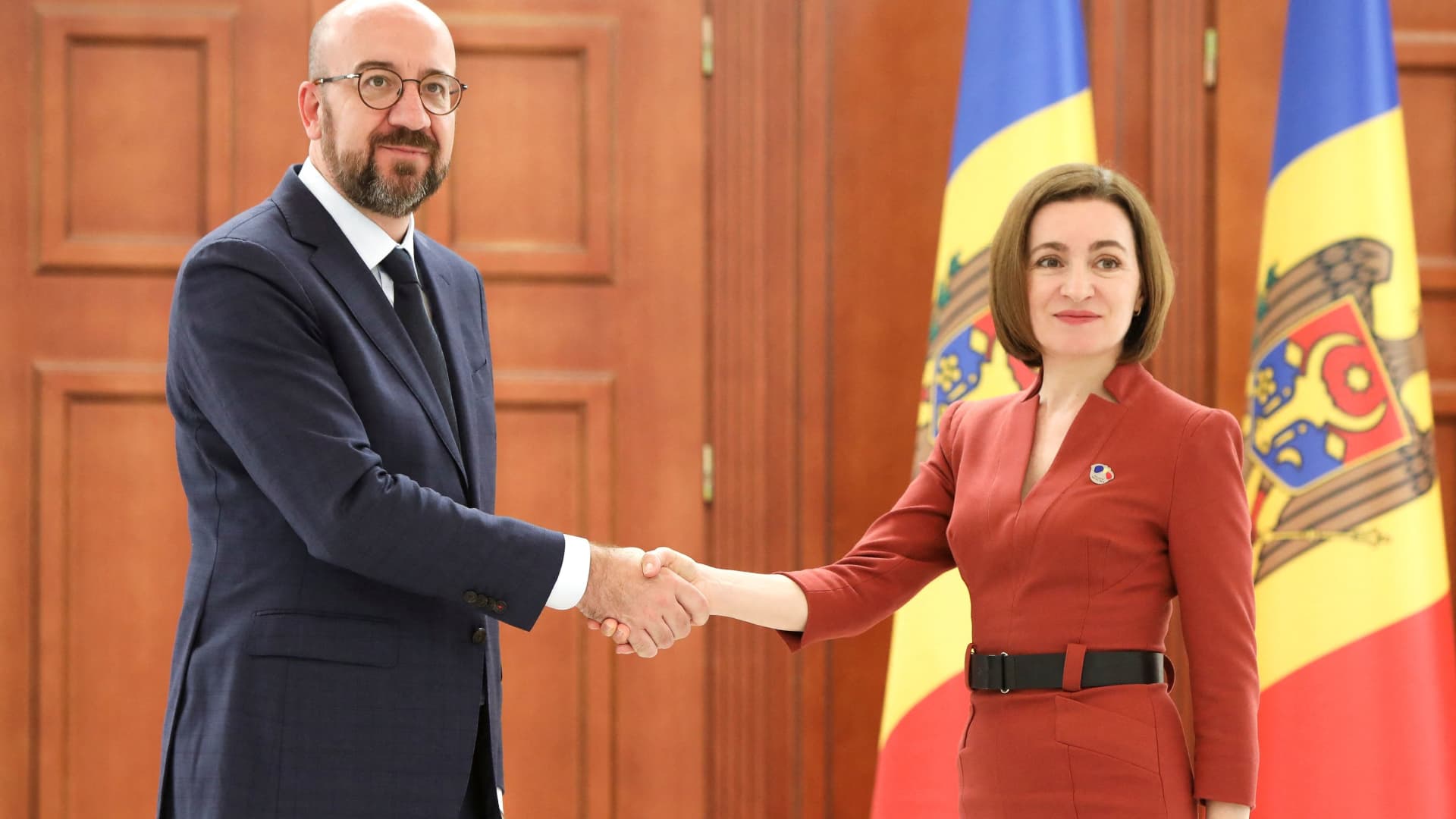
The European Union is considering increasing its military support to Moldova as recent Russian rhetoric suggests it may soon expand its war past Ukraine's borders.
During a visit to Moldova's capital of Chisinau, European Union Council President Charles Michel said the EU would work to "significantly increase our support to Moldova by providing its armed forces with additional military equipment."
Michel also said that the EU would provide support to counter disinformation campaigns and cyberattacks.
The ongoing war next door has put the landlocked country of Moldova, a former Soviet republic and one of Europe's poorest nations, in a precarious position. Moldova is Eastern Europe's smallest nation, with a population of fewer than 3 million and a landmass slightly larger than the state of Maryland.
Adding to Moldova's vulnerability on Eastern Europe's frontlines is its complete reliance on Russian gas supplies.
— Amanda Macias
UK bars Russian businesses from working with British consulting, accounting and PR firms
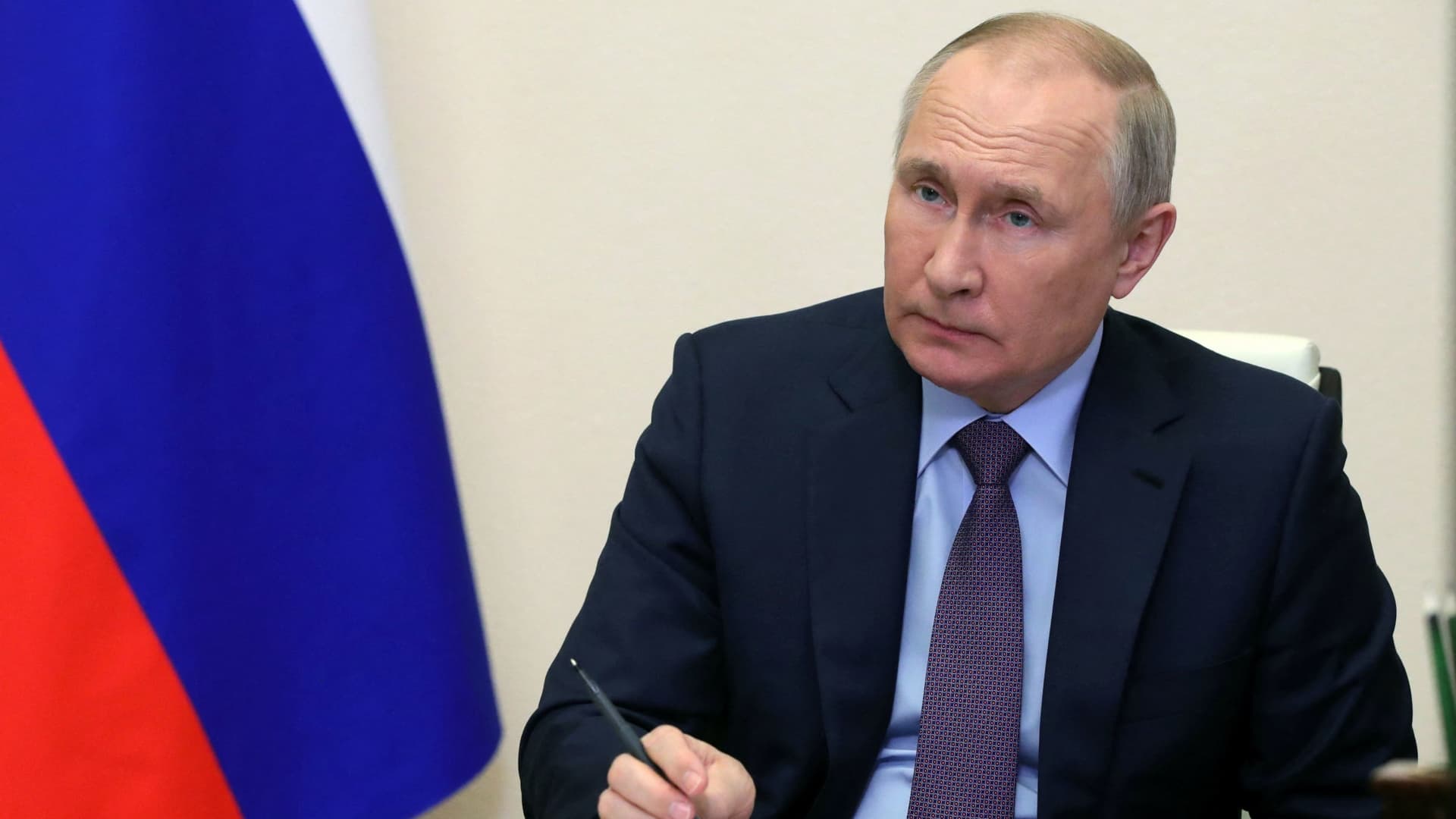
British Foreign Secretary Liz Truss said the U.K. would cut Russia off from British management, consulting, accounting and public relations services, a sector Moscow is "heavily reliant on."
"Doing business with Putin's regime is morally bankrupt and helps fund a war machine that is causing untold suffering across Ukraine. Cutting Russia's access to British services will put more pressure on the Kremlin and ultimately help ensure Putin fails in Ukraine," Truss said in a statement announcing the new ban.
U.K. Business Secretary Kwasi Kwarteng said the move would ratchet up economic pressure on the Kremlin.
"Our professional services exports are extraordinarily valuable to many countries, which is exactly why we're locking Russia out," Kwarteng added.
— Amanda Macias
UN says 3,238 killed in Ukraine since start of war, warns death toll is likely higher
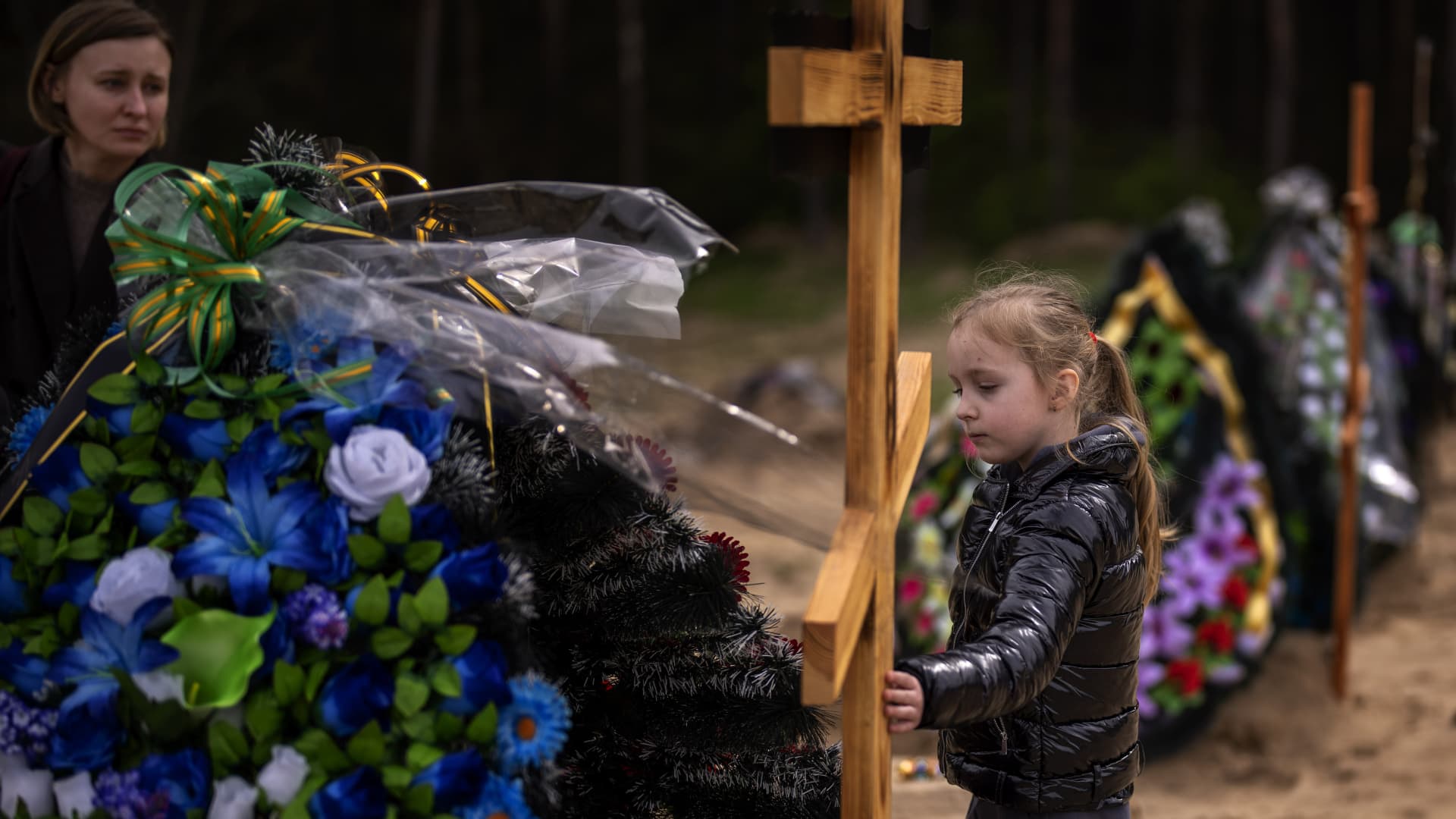
The United Nations has confirmed 3,238 civilian deaths and 3,397 injuries in Ukraine since Russia invaded its ex-Soviet neighbor on Feb. 24.
Of those killed, the U.N. has identified at least 71 girls and 84 boys, as well as 72 children whose gender is unknown.
The Office of the UN High Commissioner for Human Rights said the death toll in Ukraine is likely higher, because the armed conflict can delay reports.
The international body said most of the civilian casualties recorded were caused by the use of explosive weapons with a wide impact area, including shelling from heavy artillery and multiple launch rocket systems, as well as missiles and airstrikes.
— Amanda Macias
Watching from space, satellites collect evidence of war crimes
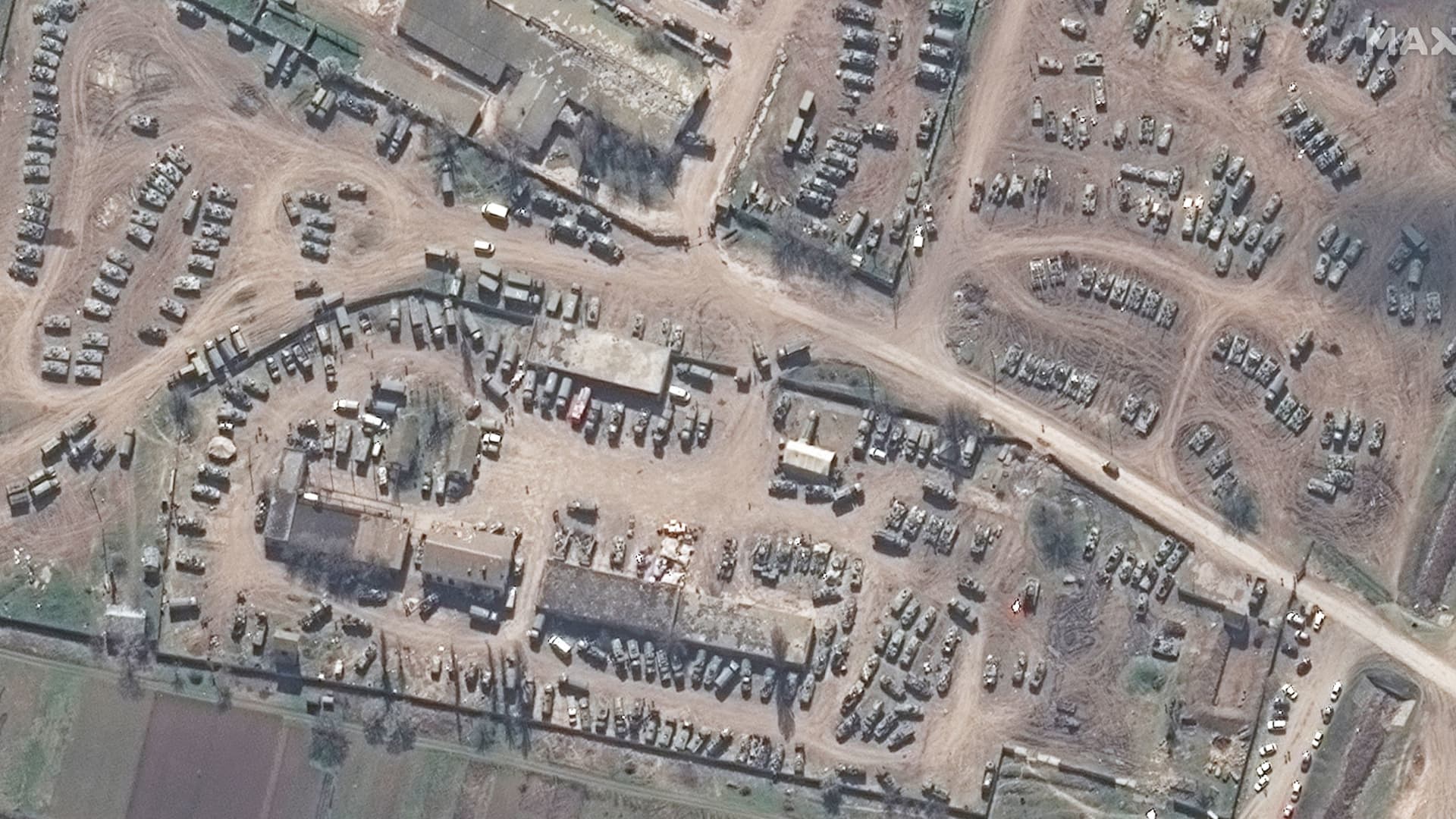
Few developments in Ukraine have escaped the all-seeing eyes of satellites.
From their orbital perches, Earth-watching satellites have followed the movement of troops around the country, zeroing in on strikes in contested areas and witnessing the aftermath of attacks.
Now, these "eyes in the sky" are gathering images in greater quantities and at higher resolutions than ever before, collecting what could end up as crucial pieces of evidence in investigations into potential war crimes committed by Russia since its military assault began on Feb. 24.
Experts say satellite imagery, together with on-the-ground photos and eyewitness accounts, could be vital in providing evidence to be able to take those responsible for Russia's alleged war crimes to court.
Read the full story here.
— Denise Chow and Yuliya Talmazan, NBC News
Ukraine 'ready' if Belarus joins Russian invasion
Kyiv will be ready if Belarus' armed forces join Russia's war effort in Ukraine, a spokesperson for the Ukrainian State Border Service said on Wednesday, Reuters reported.
Russia's close ally Belarus announced on Wednesday that its armed forces had begun snap military drills in order to test their combat readiness. The move has raised concerns in Europe that Belarus could assist Russia's invasion and a renewed assault on northern Ukraine where its capital Kyiv is based.
"We do not rule out that the Russian Federation could at some point use the territory of Belarus, the Armed Forces of the Republic of Belarus, against Ukraine," said Andriy Demchenko, spokesperson for Ukraine's State Border Service.
"Therefore, we are ready," he said, Reuters reported.
Belarus has insisted the drills pose no threat to its European neighbors.
— Holly Ellyatt
Belarus launches snap combat-readiness drills
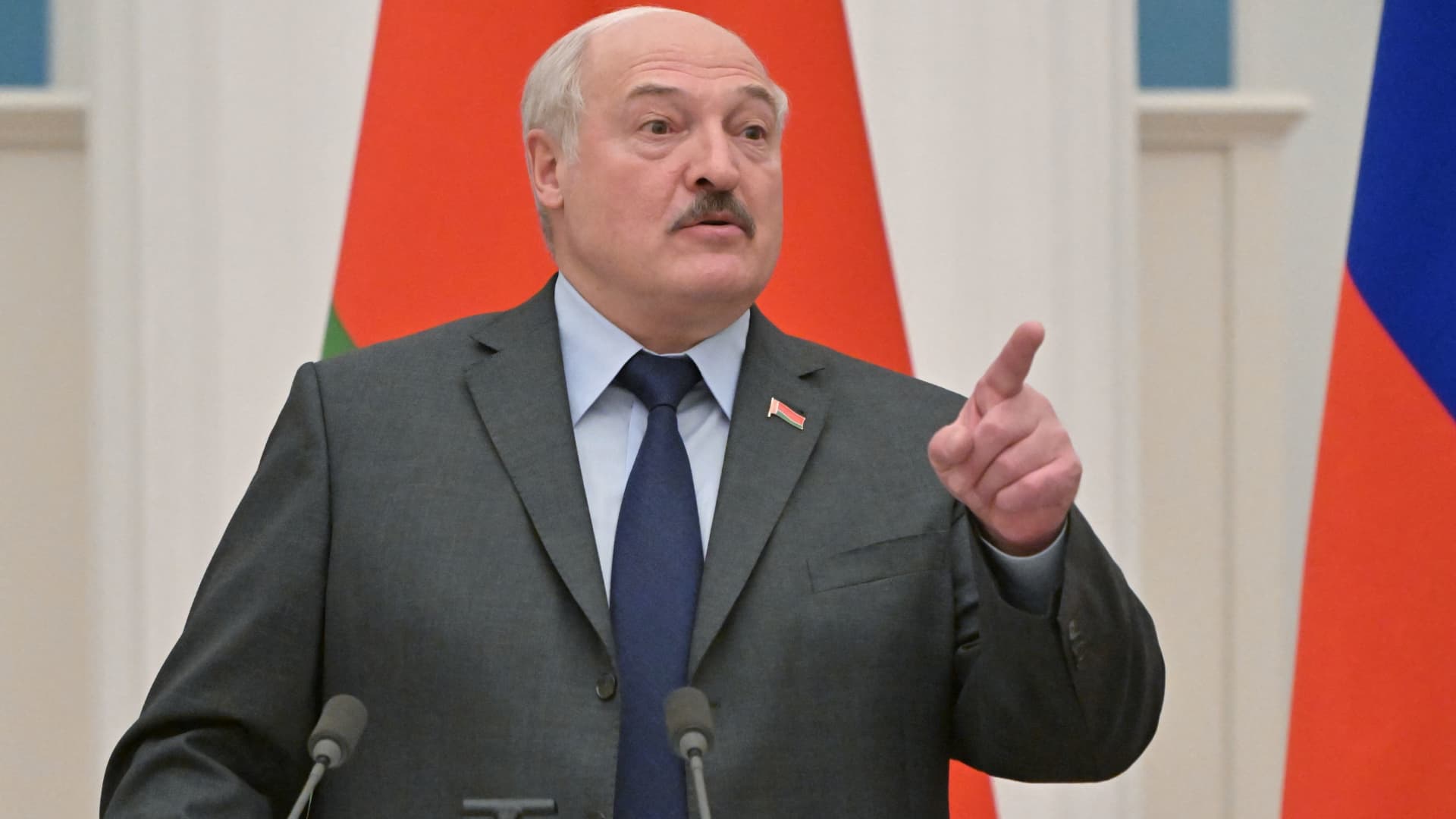
Russia's close ally Belarus has begun snap large-scale military drills on Wednesday to test the combat readiness of its army, the defense ministry said, according to state news agency BelTA.
During the inspection, military units and subunits will practice getting fully operational, marching to designated areas and performing combat and training tasks.
"The purpose of the inspection is to assess the readiness and ability of personnel to quickly respond to possible crises," the news agency said, citing information from the ministry, with military units conducting drills "in unfamiliar areas of the terrain in a rapidly changing environment."
The number of forces involved in the inspection will be gradually increased, the ministry reportedly said.
It added that these activities "are some of the most effective forms of troop training and do not pose any threat to the European community as a whole or to neighboring countries in particular."
It also said the drills will involve the movement "of a significant amount of military equipment," which may complicate traveling on public roads.
Belarusian President Alexander Lukashenko spoke to his Russian counterpart Vladimir Putin on Tuesday and the two discussed the Russian invasion — or what Russia calls its "special military operation" — in Ukraine, according to official statements.
Areas of Ukraine that are close to Belarus were under attack at the start of Russia's invasion of Ukraine but its forces have since focused on the south and east of the country. New drills by Belarus are likely to heighten fears that Belarus' forces could become involved in the wider conflict and be used as part of a renewed assault on northern Ukraine, and its capital Kyiv.
— Holly Ellyatt
Russia bars entry to Japanese officials, including Prime Minister Kishida
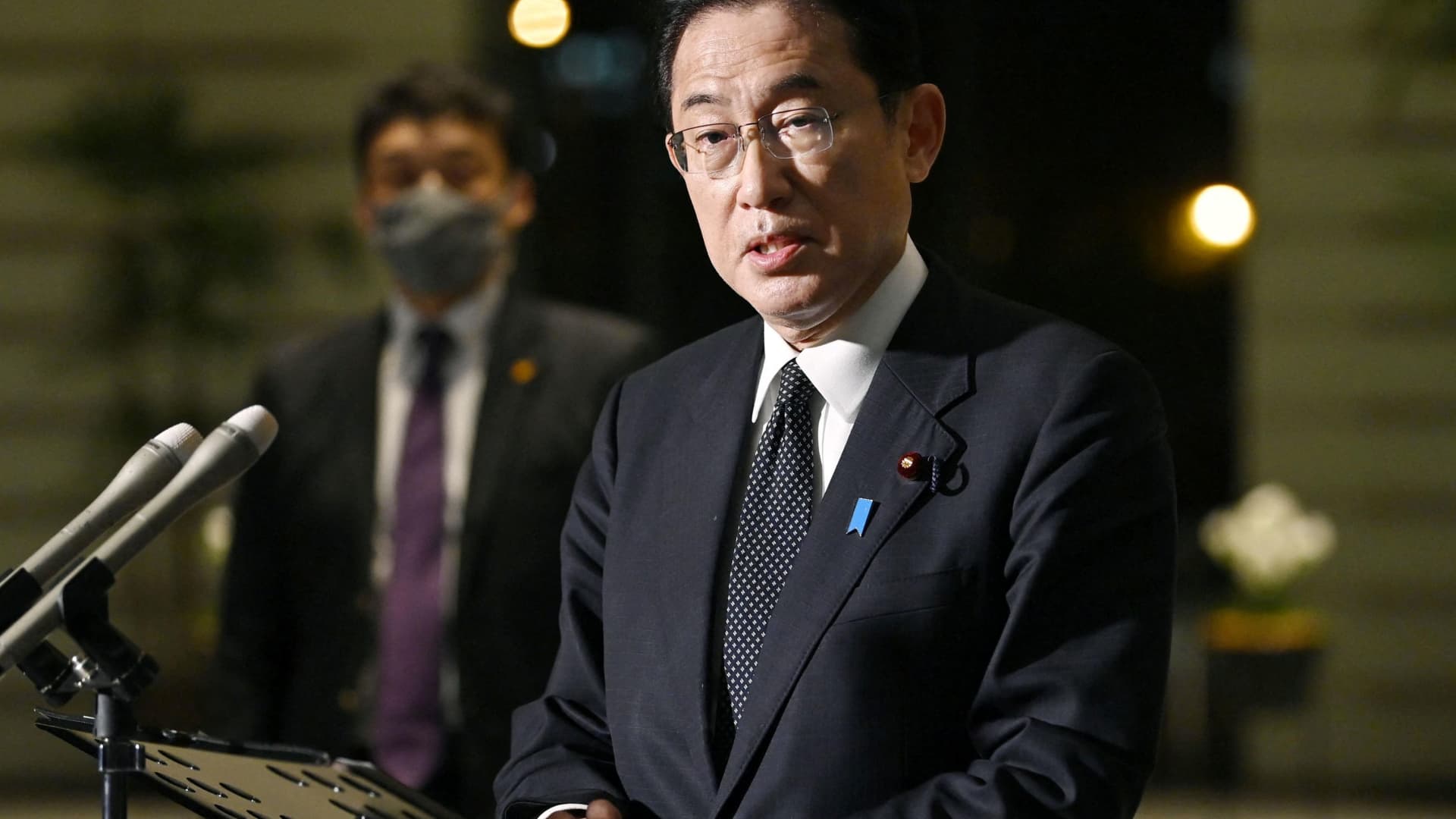
Russia's Foreign Ministry has announced sanctions against 63 Japanese officials and other prominent individuals citing what it called "unacceptable rhetoric" against Moscow as a rationale for the move.
The list of sanctioned personnel includes Japanese Prime Minister Fumio Kishida and Foreign Minister Yoshimasa Hayashi as well as various other ministers, business people, academics and journalists. A full list was announced by the ministry on its Facebook page.
In a statement on the social media network, Russia accused Kishida's administration of launching what it claimed was "an unprecedented anti-Russian campaign, allowing unacceptable rhetoric against the Russian Federation, including slander and direct threats."
"Tokyo is taking practical steps aimed at dismantling good-neighborhood ties, damaging the Russian economy and the international authority of our country," the ministry said.
It said that in light of Japanese sanctions against Russia, including its leadership, it had taken the decision to ban the 63 Japanese citizens listed from entering Russia for an indefinite period.
Japan's Foreign Ministry has yet to publicly respond to the ban.
— Holly Ellyatt
Russian submarine fires missiles at targets in Ukraine: Report
Russia's Defense Ministry has reportedly said that a submarine in its Black Sea fleet has attacked targets in Ukraine.
"The crew of a submarine of the Black Sea Fleet ... carried out a salvo launch of two Kalibr cruise missiles at designated ground targets on the territory of Ukraine," the Russian Defense Ministry said in a statement, Interfax news agency reported.
The ministry said the strike was carried out on Ukrainian military infrastructure and published video footage of the launch of Kalibr missiles.
CNBC was unable to independently verify the information from the ministry.
— Holly Ellyatt
Russian economy will feel a 'devastating blow' from EU oil embargo, strategist says
Timothy Ash, emerging markets senior sovereign strategist at BlueBay Asset Management, discusses the implications of the EU's proposals to gradually ban Russian oil imports.
EU proposes gradual ban on Russian oil imports
The European Commission, the executive arm of the EU, has put forward new sanctions against the Kremlin which will include a six-month phase out of Russian crude imports.
Russia's unprovoked invasion of Ukraine, and evidence of war crimes, has pushed the EU to take bolder steps on energy sanctions. But imposing measures that could reduce, or fully cut, Russian energy supplies to the EU have been a complicated task for the bloc which is heavily reliant on Russian energy.
"Let us be clear: it will not be easy," European Commission President Ursula von der Leyen said at a press conference Wednesday.
"Some Member States are strongly dependent on Russian oil. But we simply have to work on it. We now propose a ban on Russian oil. This will be a complete import ban on all Russian oil, seaborne and pipeline, crude and refined."
— Silvia Amaro
EU expected to announce sanctions on Russian oil
The EU is expected to announce further sanctions on Russia on Wednesday, this time targeting Russian oil imports.
The move is difficult for the bloc as some member states, particularly Hungary and Slovakia, are heavily reliant on oil imports from Russia, prompting expectations that these countries could be spared an embargo for now.
On Tuesday, Hungary's Foreign Minister Peter Szijjarto said his country would not support sanctions that would make it impossible to receive oil from Russia, Reuters reported, creating the potential for further division between the country — which has cultivated warm relations with Russia in recent years — and Brussels.
An embargo on Russian oil imports would be the bloc's sixth round of sanctions against Russia since its invasion of Ukraine began in late February.
— Holly Ellyatt
U.S. and Sweden discuss Europe's security situation
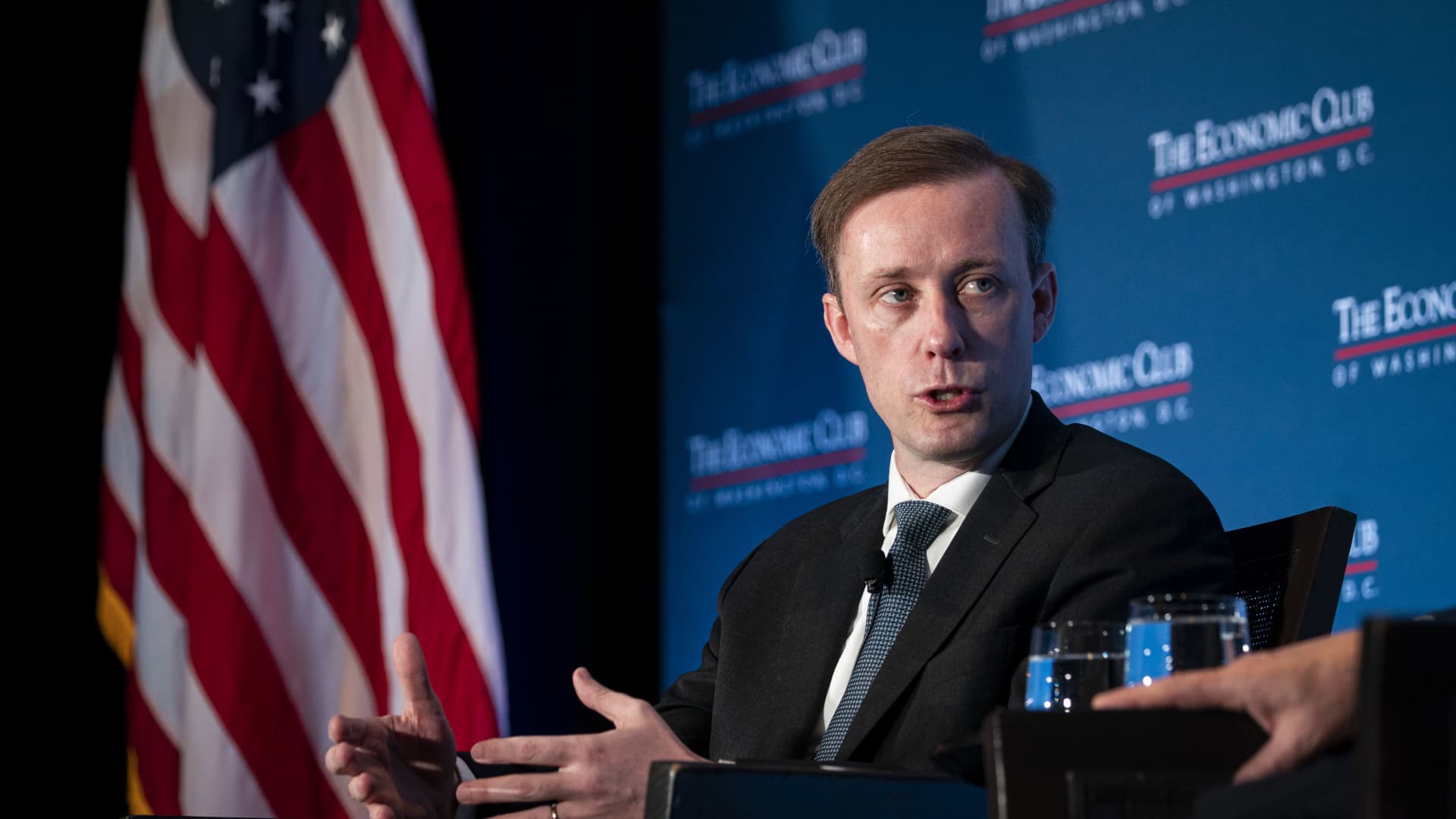
U.S. national security advisor Jake Sullivan met with Oscar Stenstrom, state secretary for foreign affairs to the prime minister of Sweden, according to a statement from U.S. National Security Council spokesperson Adrienne Watson.
The two discussed the security situation in Europe as well as efforts to support Ukraine and impose costs on Russia.
Sullivan and Stenstrom also pledged to continue close coordination on the full range of security issues.
— Chelsea Ong
Mariupol steel plant evacuees arrive safely in Zaporizhzhia city after months underground
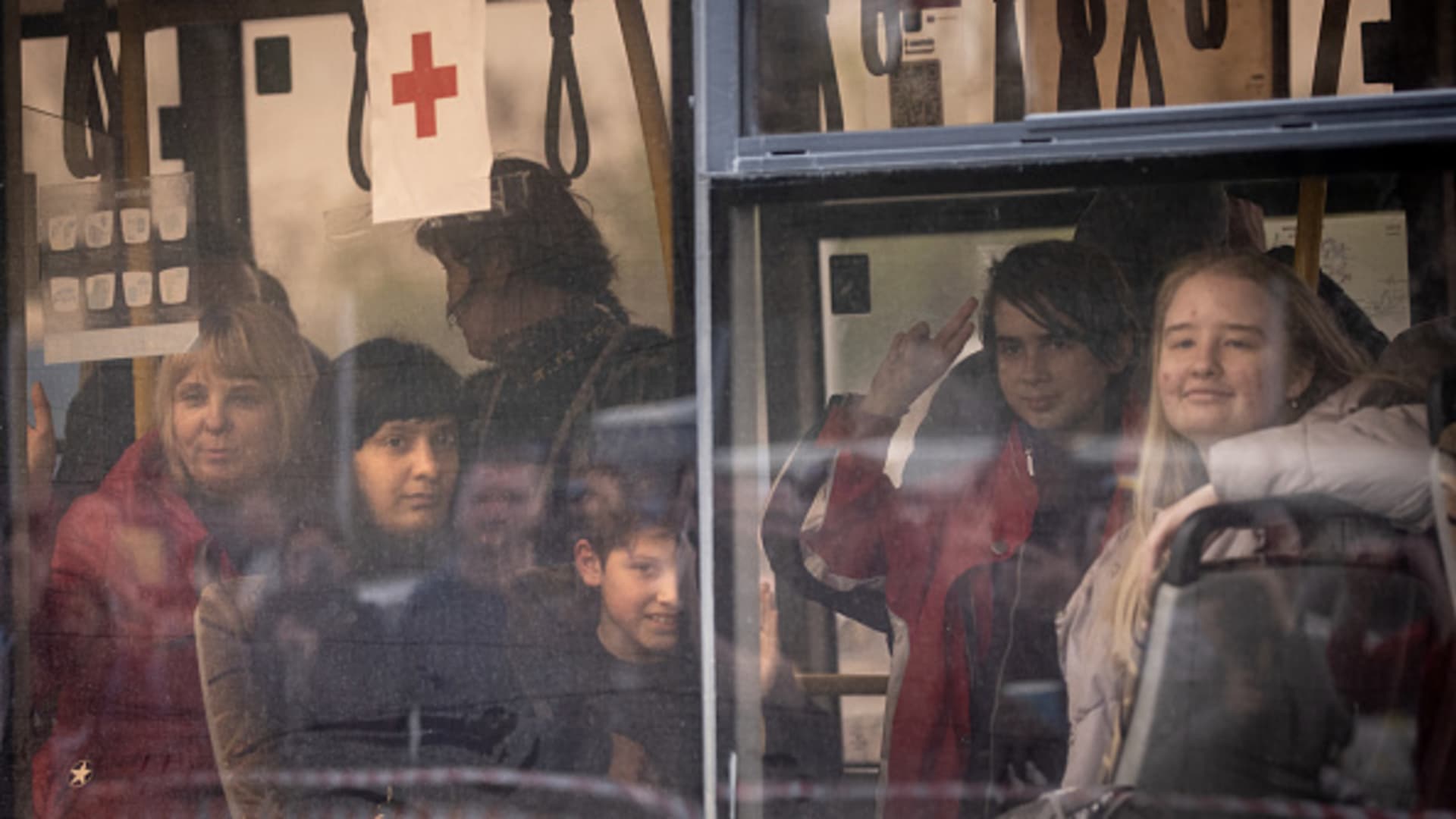
A group of civilians who were evacuated earlier this week from the Azovstal steel plant in Mariupol, a last stronghold for Ukrainian fighters in the besieged port city, have reached the relative safety of the Ukrainian-controlled city of Zaporizhzhia.
"We finally have a result, the first result of our evacuation operation from Azovstal in Mariupol, which we have been organizing for a very long time," Ukraine's President Volodymyr Zelenskyy said in his nightly address on Telegram.
"It took a lot of effort, long negotiations and various mediations. Today 156 people arrived in Zaporizhzhia. These are women, children," he said.
Some of those evacuated had been sheltering beneath the steelworks for more than two months, the president noted, adding that there would be more efforts to evacuate "everyone who remains there, both civilians and military, from Mariupol, from Azovstal." Several hundred civilians are believed to remain trapped in the steel plant complex.
Zelenskyy accused the Russian military of not holding up its end of the agreement to allow the evacuation — carried out under the auspices of the United Nations and Red Cross — to go ahead, claiming Russian forces are "continuing to conduct mass strikes at Azovstal. They are trying to storm the compound."
He also said the Russian shelling of areas of western Ukraine is "evidence that Russia does not have any special military objective. Hitting Zakarpattya [the most western part of Ukraine]. What specifically can it give to Russia?" he said.
— Holly Ellyatt
UK says Russia intends to capture cities to consolidate control in northeastern Donbas
Russia intends to capture the cities of Kramatorsk and Severodonetsk to help consolidate control in northeast Donbas, the U.K. Defence Ministry said in an intelligence update.
If successful, this would provide a staging point for Moscow's efforts to cut off Ukrainian troops in eastern Ukraine, the ministry said.
Still, the agency said Russian troops are struggling to break through Ukrainian defenses and build momentum.
— Christine Wang
Israel is 'inclined' to provide more military aid to Ukraine, reports Haaretz
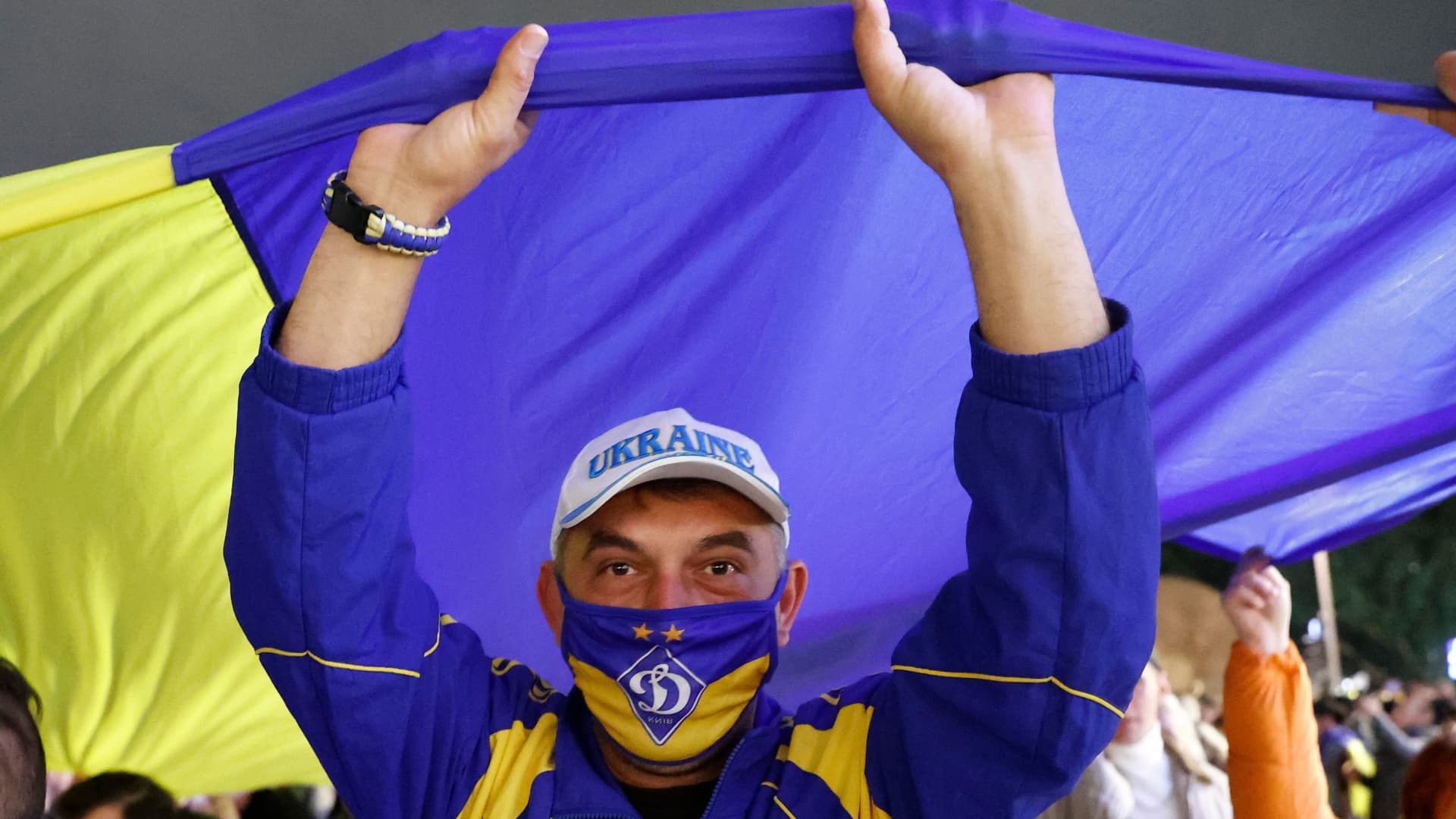
Officials in Israel are reportedly preparing to send more military and humanitarian aid to Ukraine.
Among the items being considered are "defensive systems that protect troops on the ground, personal combat gear and warning systems," according to the leading Israeli newspaper Haaretz.
The discussions come as Israel faces growing pressure from the U.S. and the European Union to take a firmer stance on Russia's brutal invasion, which is now in its third month.
Notably, the talks also coincide with the rapid deterioration in recent days of Israel's diplomatic relations with Russia.
The breakdown began when Russian Foreign Minister Sergey Lavrov tried to defend Russia's claim that it is "de-Nazifying" Ukraine — a country whose president is Jewish — by saying that "the biggest antisemites were Jewish," including "Hitler."
The remarks infuriated officials in Jerusalem. But instead of backing away from Lavrov's comments, Russia's Foreign Ministry doubled down on Tuesday, accusing Israel of supporting a "neo-Nazi regime" in Kyiv.
Despite the breakdown in relations between Moscow and Jerusalem, Haaretz reported that as of Tuesday, Israel was not yet ready to provide its most sophisticated and lethal weapons systems to Ukraine.
--- Christina Wilkie
Portraits of war: Photos from Russia's war and its impact on Ukrainians
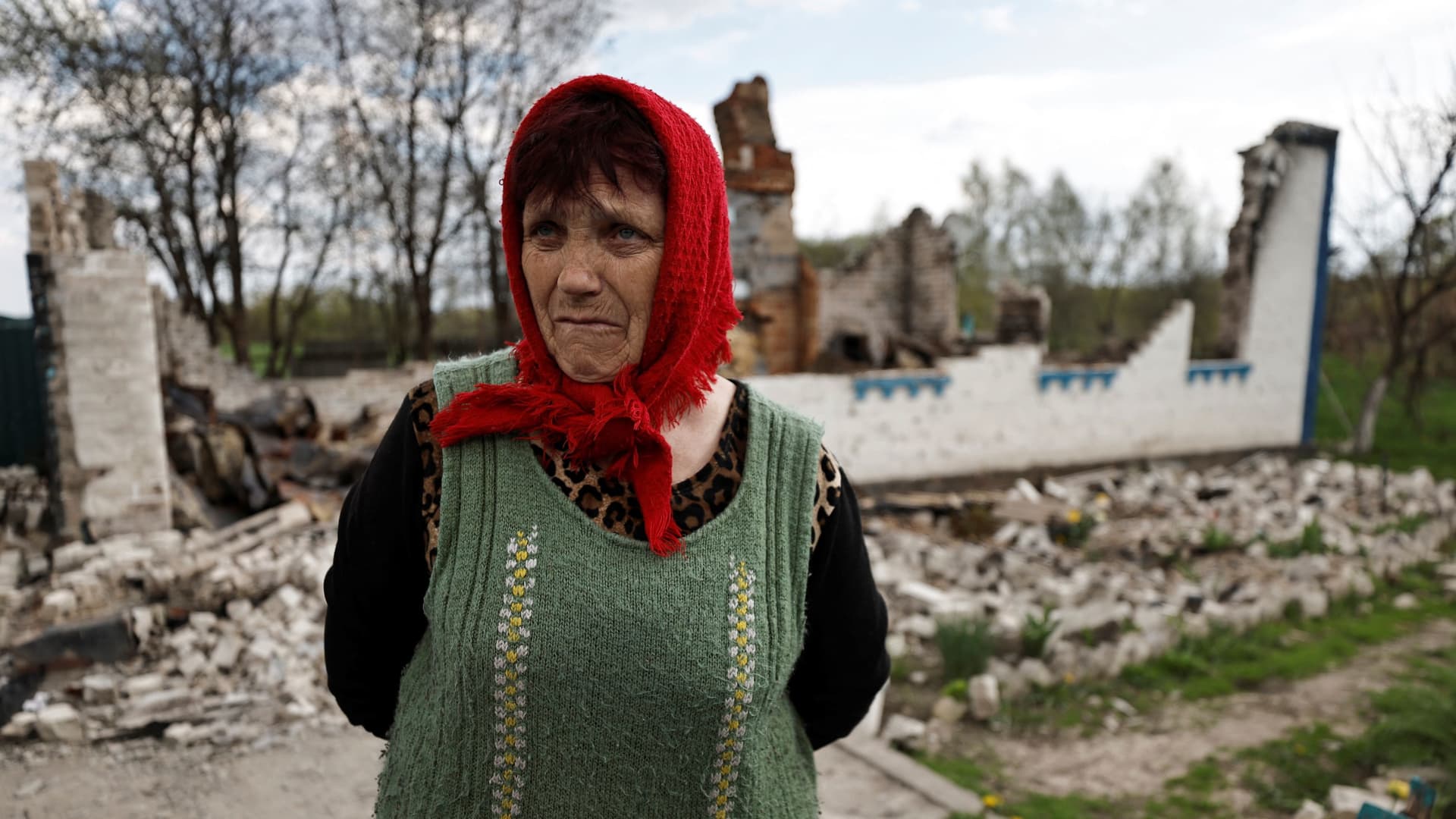
Russian President Vladimir Putin invaded Ukraine on Feb. 24, an unprovoked act that has led to carnage across the country. The war has displaced more than 5.5 million Ukrainians, mostly the elderly, women and children.
As desperate Ukrainians flee their homes to neighboring NATO member countries — Poland, Slovakia, Hungary and Romania — Russian forces have focused their military might in eastern and southern Ukraine after weeks of stalled ground advances on the capital city of Kyiv.
Here is a look at some of the faces and lives forever affected by Russia's horrific war.
Editor's note: Graphic content. The following post contains photos of dead and wounded civilians and soldiers.
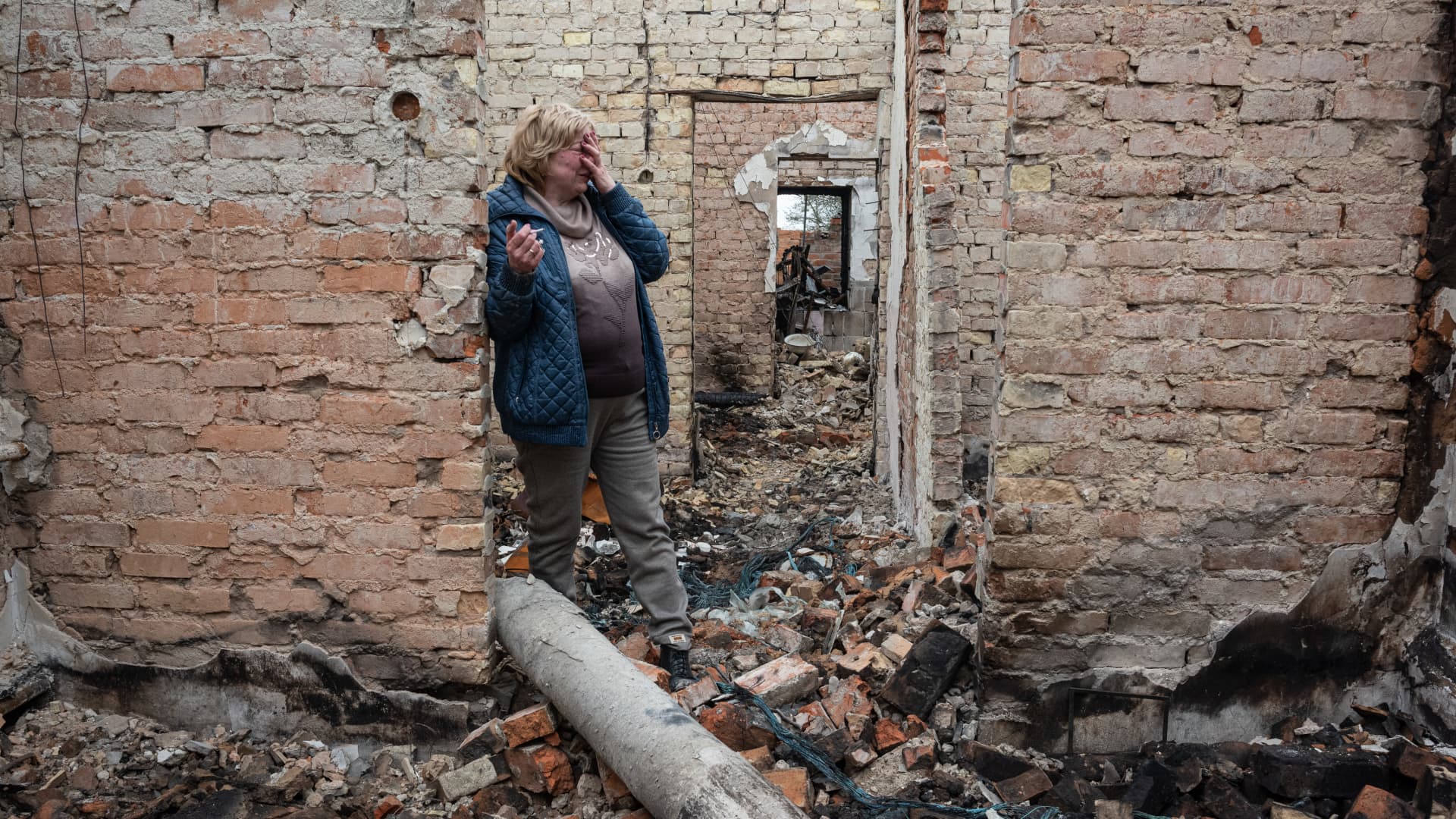
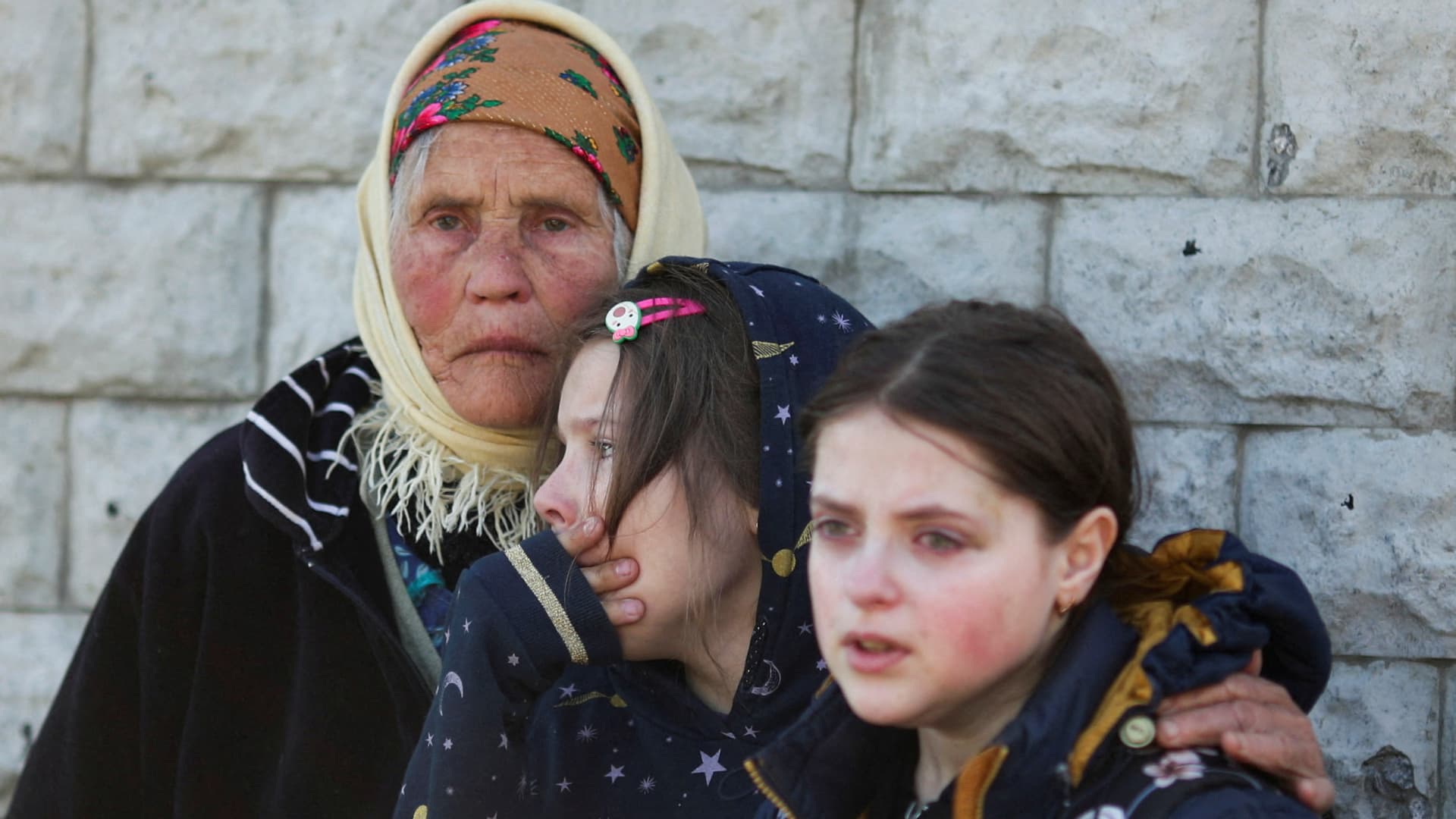
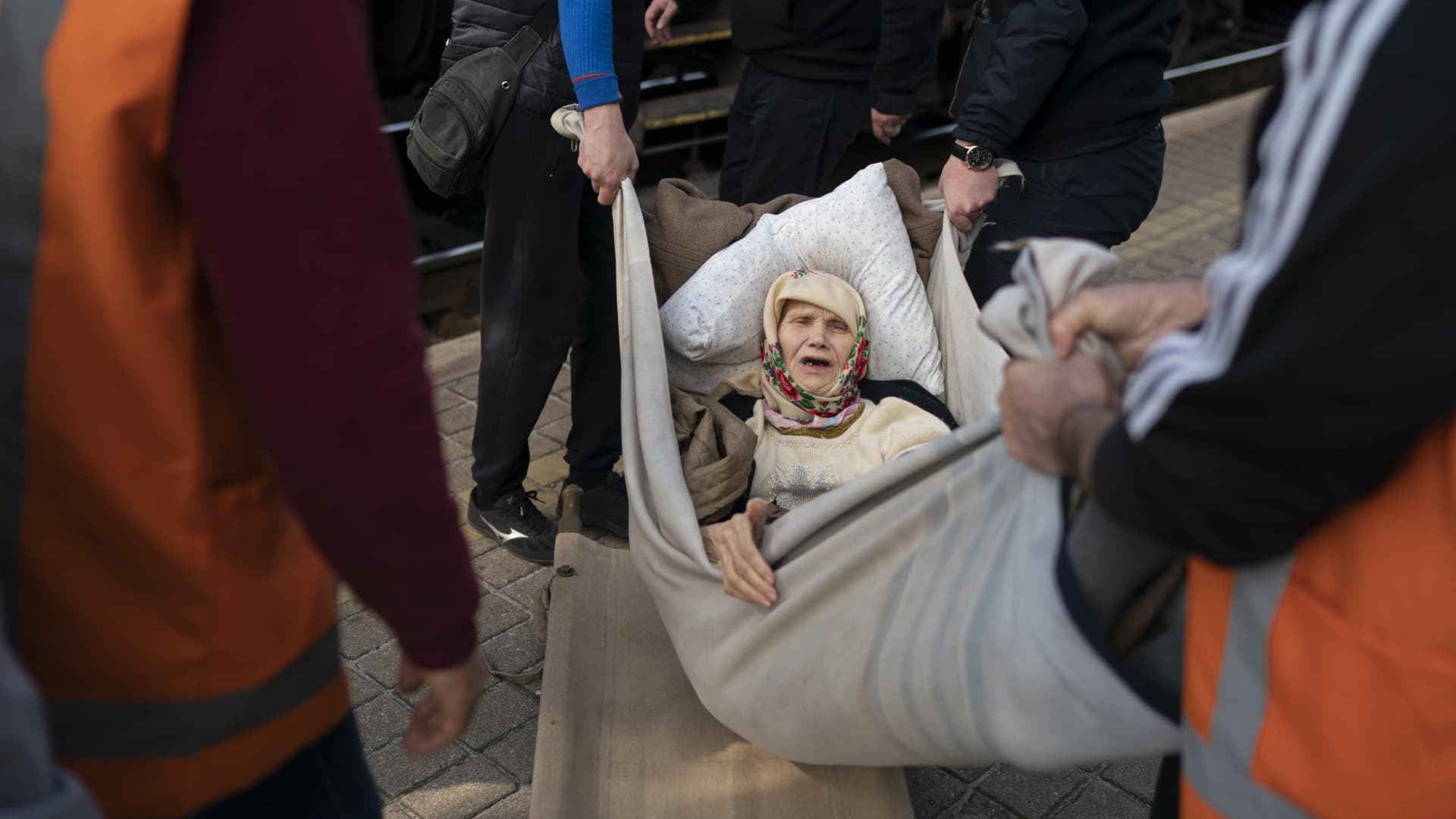
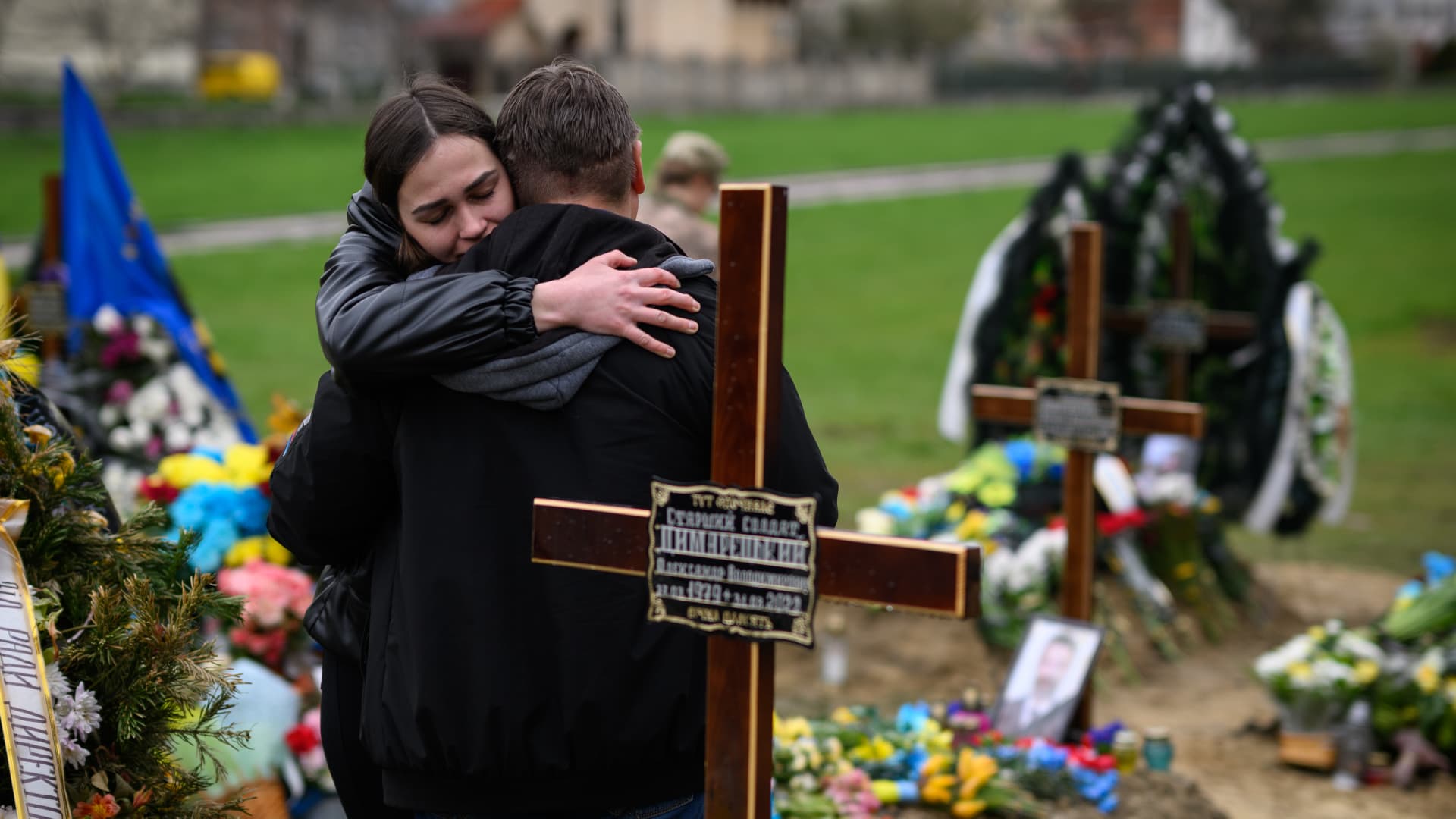
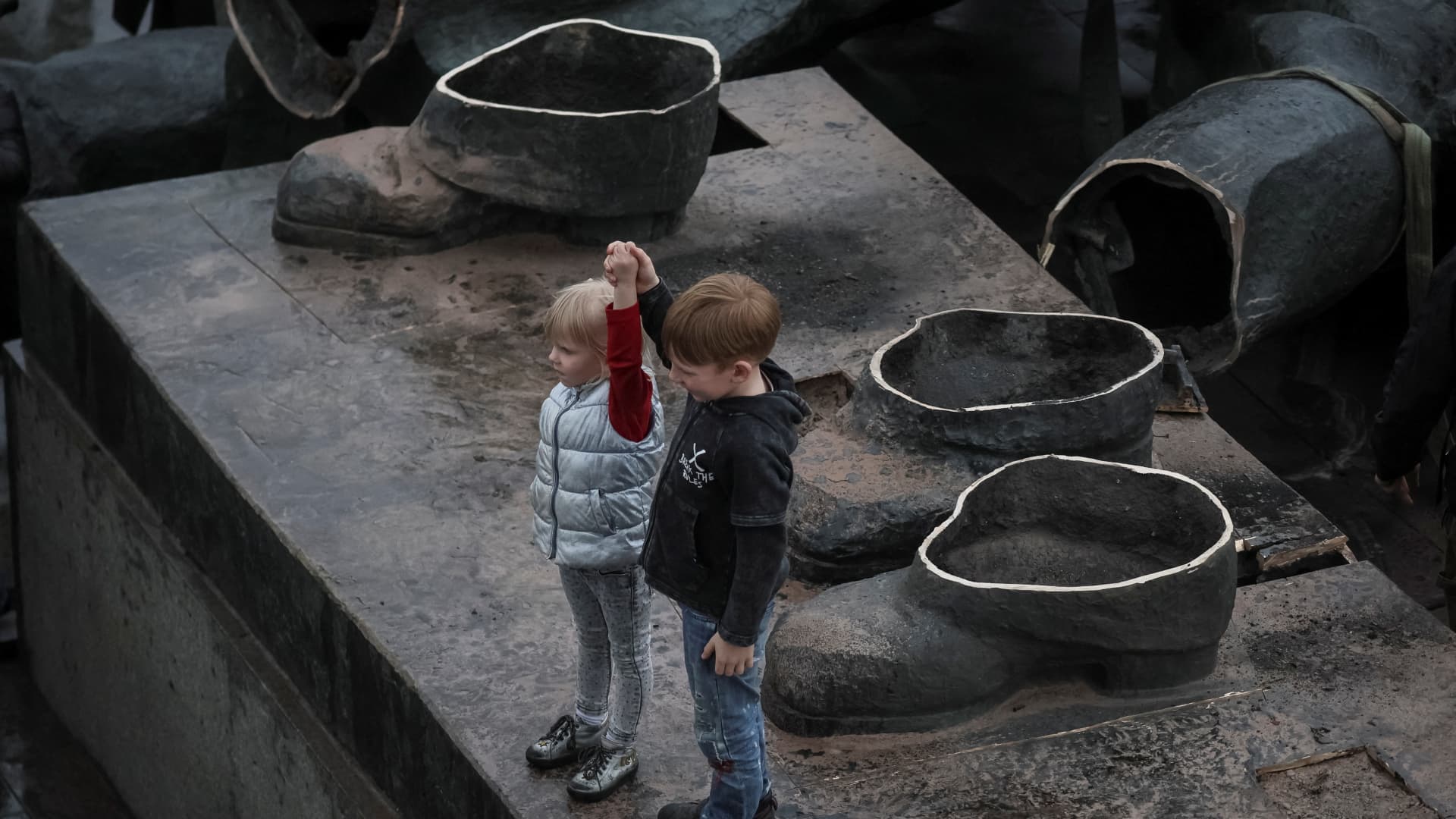
— Amanda Macias and Adam Jeffery
Biden pushes Congress to pass $33 billion Ukraine aid package after touring Javelin production line
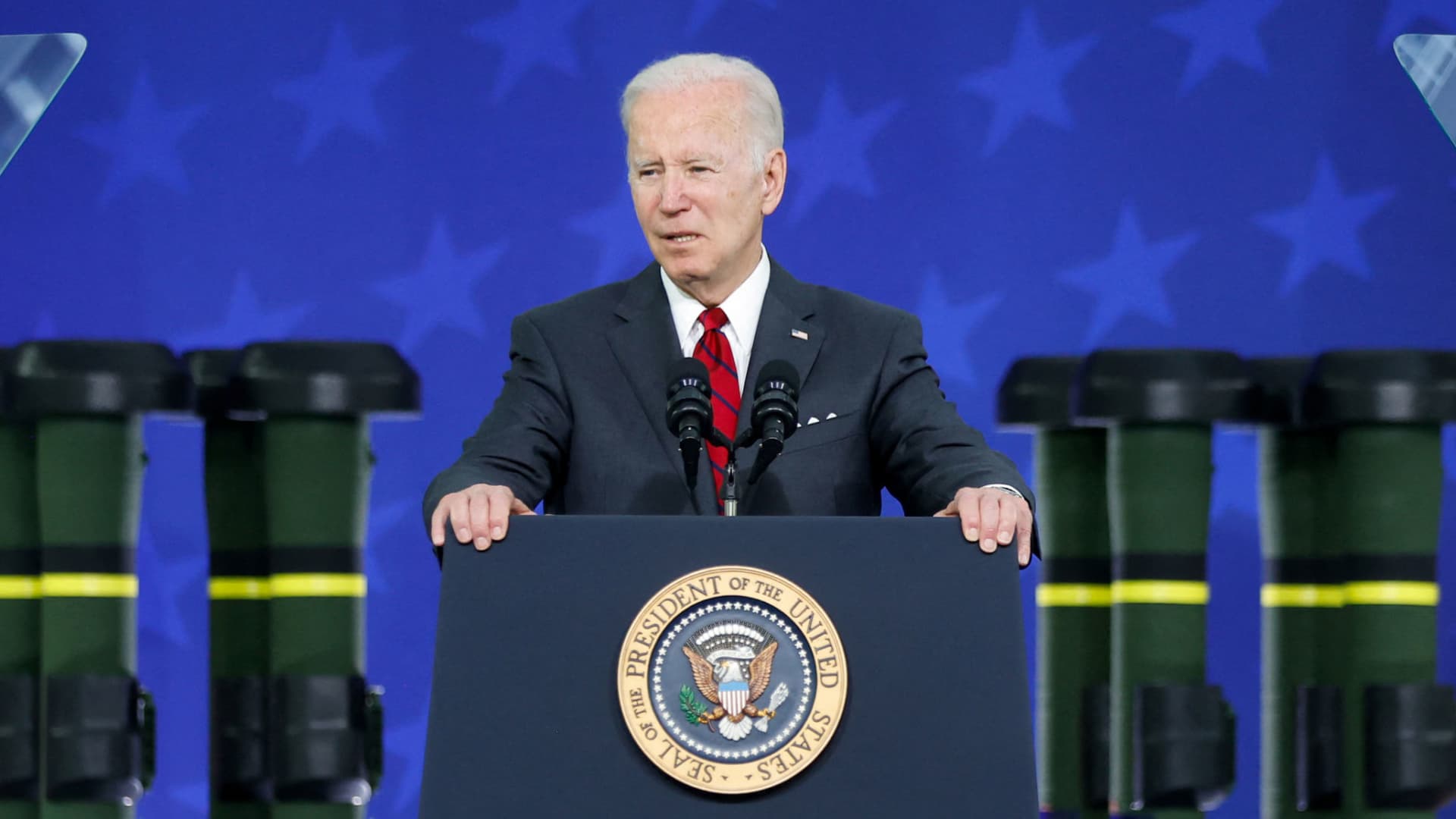
President Joe Biden called on Congress to quickly pass $33 billion in additional U.S. assistance to Ukraine, as the war-weary country approaches its 10th week of fighting off a Russian invasion.
"I urge the Congress to pass this funding quickly to help Ukraine continue to succeed against Russian aggression, just as they did when they won the battle of Kyiv and to make sure the United States and our allies can replenish our own stock of weapons to replace what we've sent to Ukraine," Biden said.
"This fight is not going to be cheap, but caving to aggression would even be more costly," added Biden, flanked by Javelin missiles at a Lockheed Martin facility in southern Alabama.
Last month, Biden requested roughly $13 billion more in funding from Congress after exhausting his presidential drawdown authority.
Biden's latest military aid package of $800 million was announced on April 21, the eighth such installment of security assistance. It brought the U.S. weapons and security commitment to Ukraine up to $3.4 billion just since Russia's late February invasion.
The new funding from Congress would add another $20 billion in weapons and security assistance, in addition to funds to help Ukraine run its government and money for additional humanitarian and food aid.
— Amanda Macias






